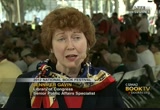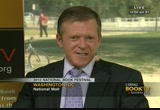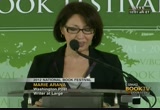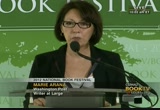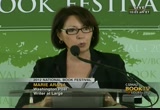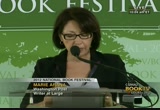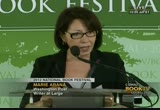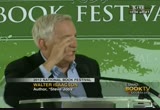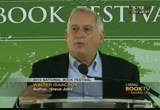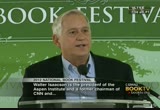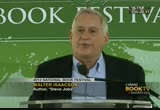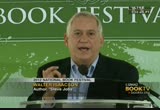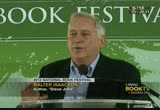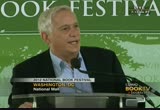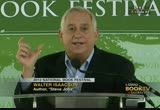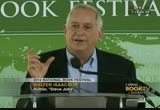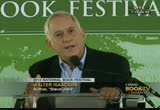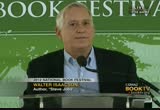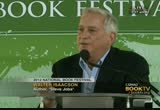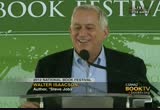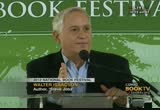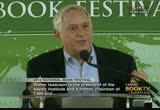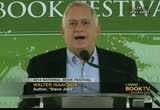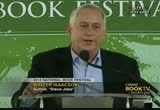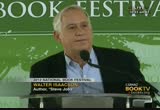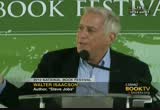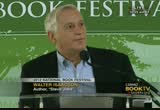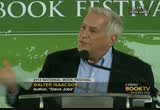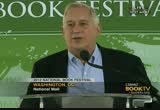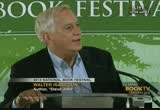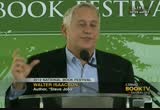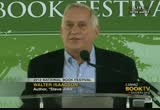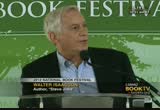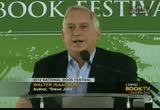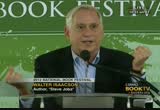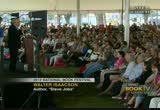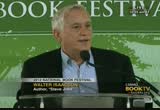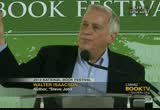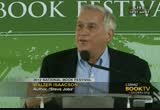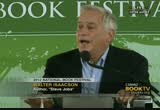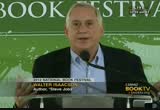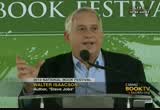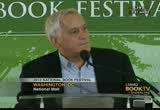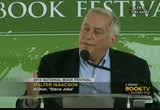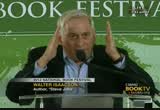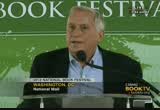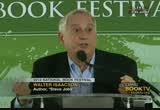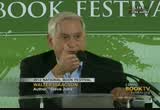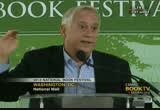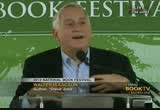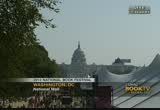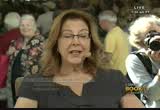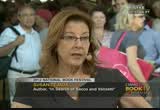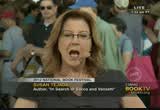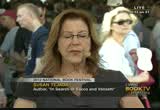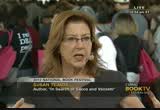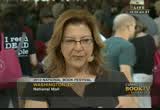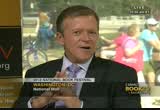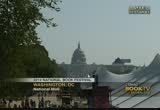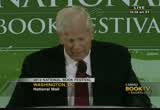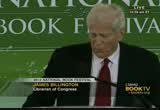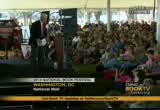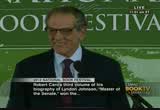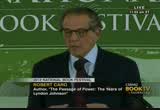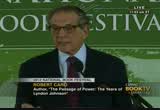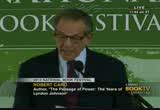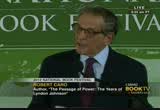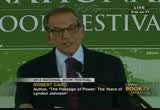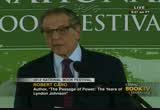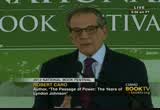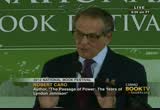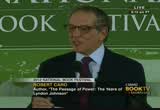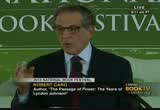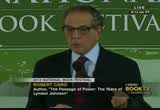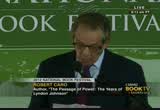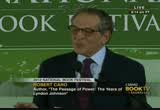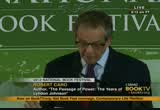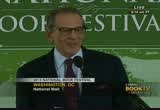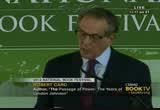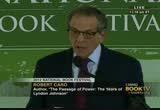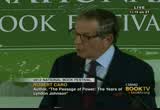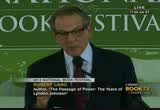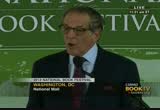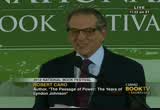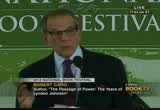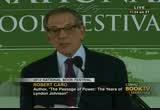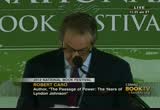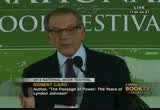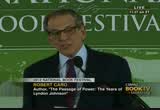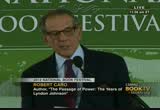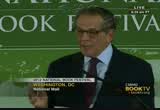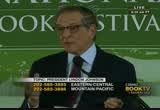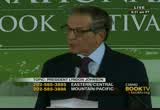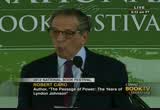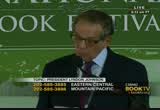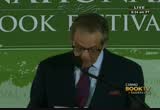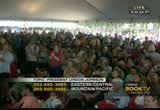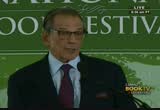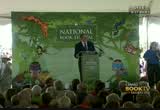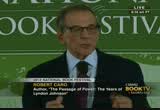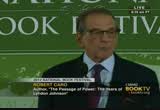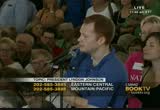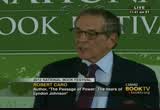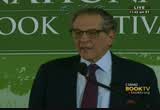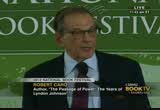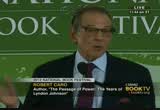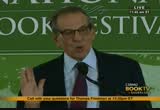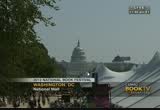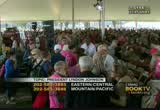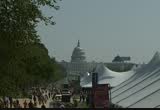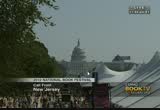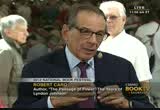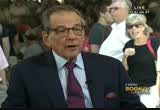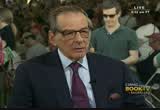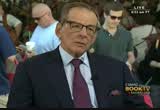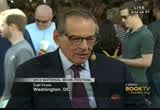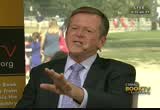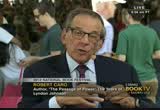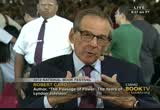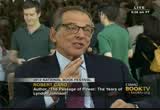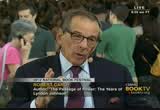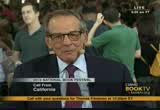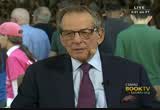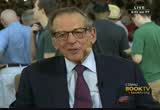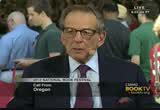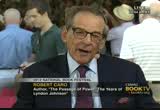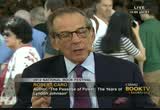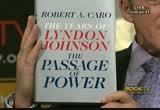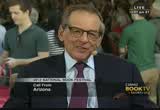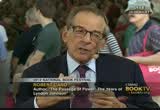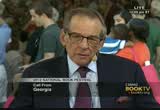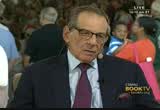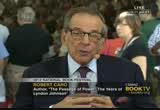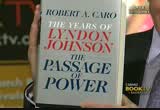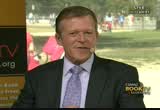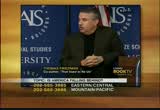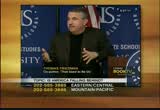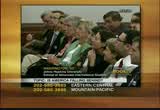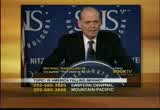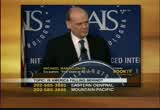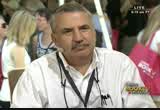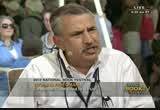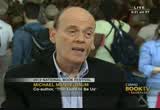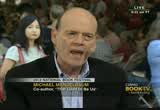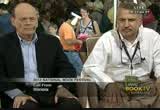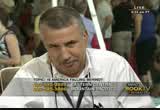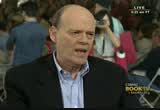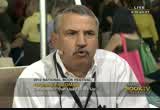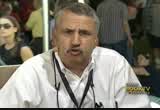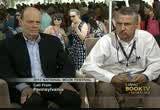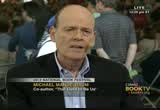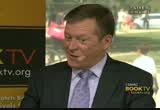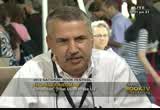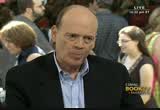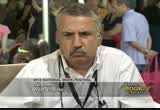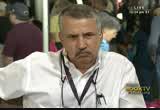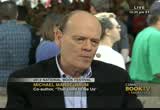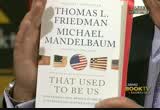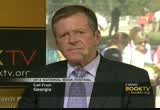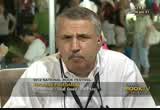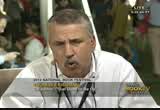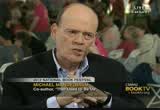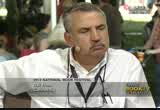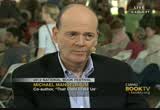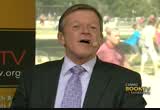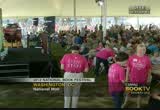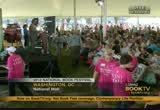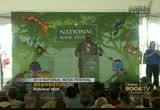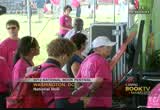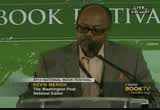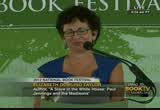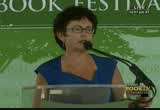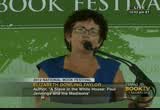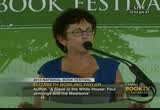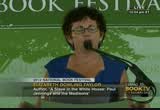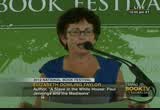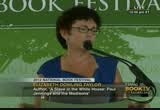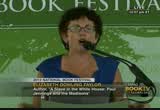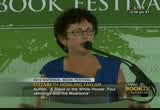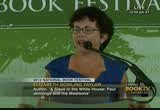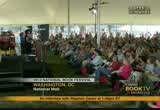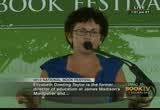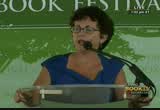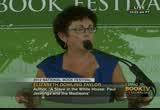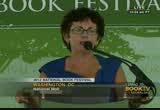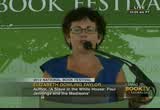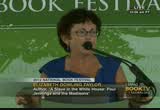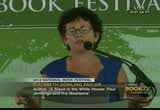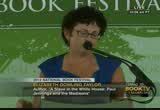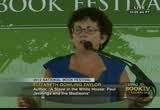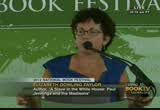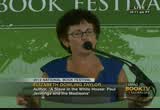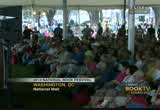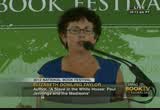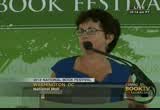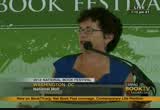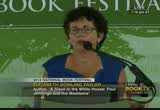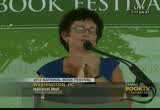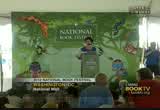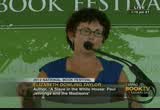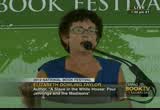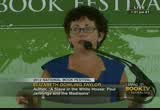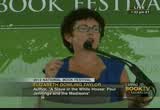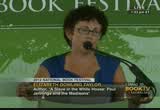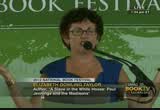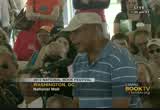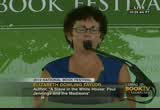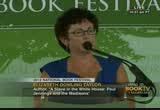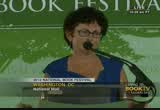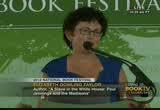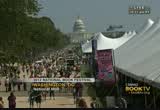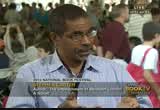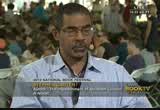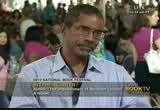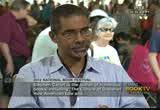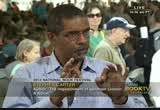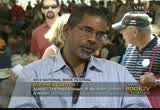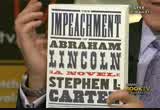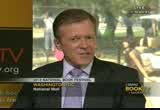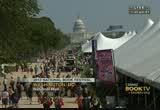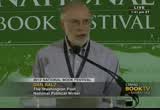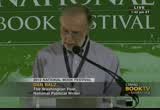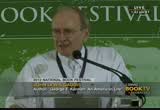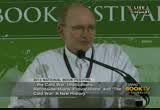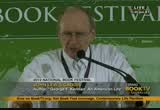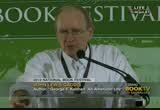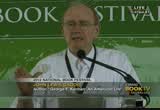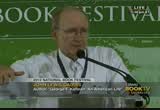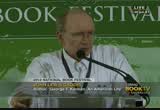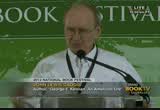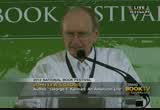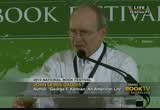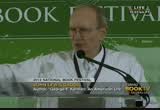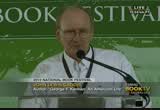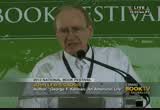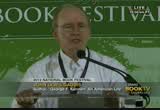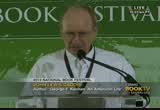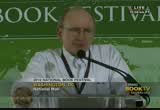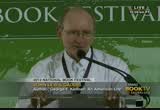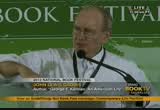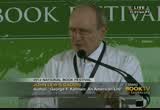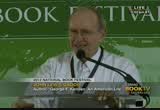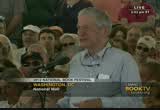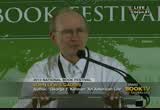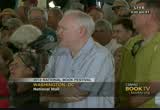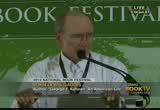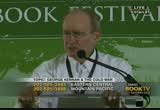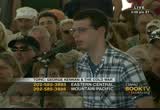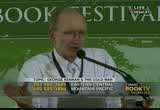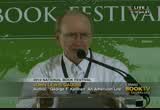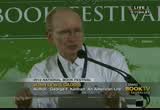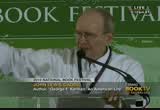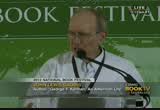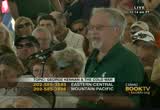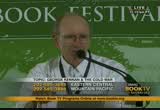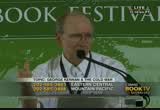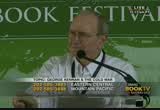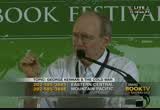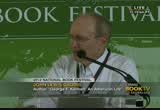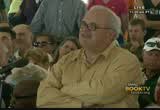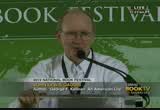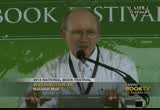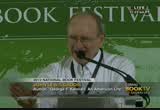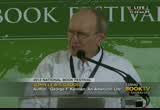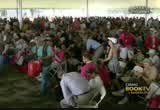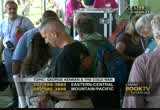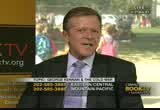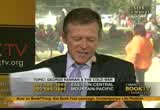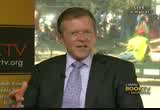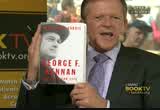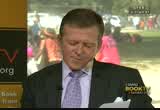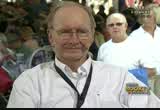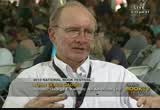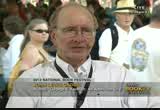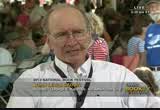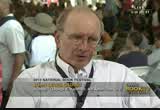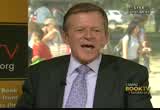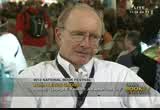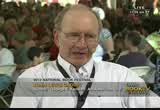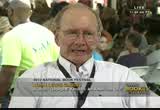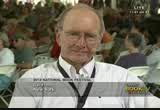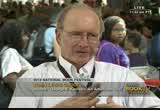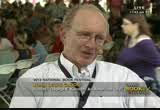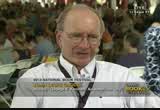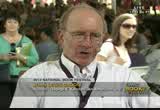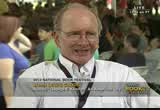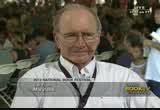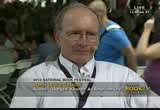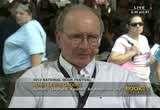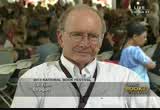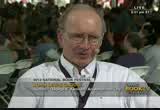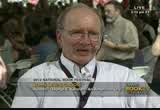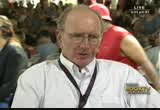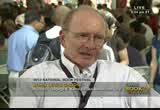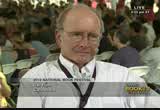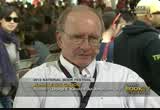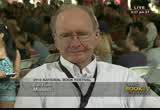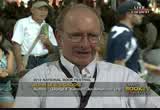tv Book TV CSPAN September 22, 2012 10:00am-3:00pm EDT
10:00 am
we also have a group that is an african-american service group called lynx and in past years they brought 300 local regional school kids to this festival to join us and a focus that effort at ten units of the links inc. are bringing several hundred new children to the book festival. many have been to washington before. ..
10:01 am
walter isaacson introduced by maria of the "washington post" talking about steve jobs. [applause] [inaudible conversations] >> hello, hello. welcome. welcome, everybody to the national book festival. my name is marie arana, a writer at large of the washington post. it is an honor and privilege to be here on this historic mall
10:02 am
for the 12th book festival brought to you by the library of congress, an institution i think it is one of the wonders of the world. thomas jefferson contributed to the collection for the libraries third -- the library has been a mecca for book lovers like you ever since. i hope you take the opportunity to look at the marvelous programs and exhibit the great national library offers the public both on site and online. i have a couple housekeeping things before i move on to introduce the first speaker. i know you are eager to hear him. first is when the question and answer period comes and you step up to the microphone you are virtually giving permission for your words to be archived in the library of congress. so, if you are on the witness protection program you may not want to do that. the of a finger on to mention as
10:03 am
we have a late addition to the festival tomorrow at 2:45 bald woodward will be appearing at the festival. but i am here to introduce a writer who has made his mark through an impressive career as a journalist, but he has also found time to give us some wonderful books. his name is known as around the globe, and i'm not kidding. i don't say this lightly. i've seen it on posters and small towns in peru in bookstores in oslo. the book that put him on the posters is a runaway seller about the best invention transforming businessmen america has ever produced, steve jobs. i am speaking of course about walter isaacson. as president and ceo of the aspen institute a forum committed to the exploration of ideas, walter has been a tireless mirror on our culture but he's also a gifted biographer, the author of six nimble human portraits among them the liesman about the
10:04 am
architects of the cold war ferc, the biography of henry kissinger and albert einstein and a marvelously readable biography about one of my heroes, benjamin franklin. "the washington post" called his book fresh, lively, imaginative and wonderfully written. from book to book walter has driven to explain what it is that makes a great leader not only young nation but of science, ideology and commerce. walter is one of those people that moves easily from history to politics to miscommunication and there is a reason why. he's been the editor of "time" magazine, the chairman and cnn, the chairman of the broadcasting board of governors, the chairman of teach for america. somewhere along the way he began to turn his voracious appetite for a good story to making stories of the zone. steve jobs, his latest book is a deeply absorbing exploration of
10:05 am
the might and personality of the founder and chief of apple incorporated. given the story to hear from steve jobs himself to write an authorized biography, someone else might have turned the book into a puff piece, heavy on accomplishment and light on flaw. but his book is anything but that. it is a full-scale portrait of a fascinating america. it's the story of a boy that started a vision in his garage with a friend from down the street turned into a worldwide phenomenon. the president of the "washington post" said yesterday walter isaacson's book is yet another perfectly designed product by steve jobs, for he knew that a book about him to be any good it would have to be written by a veteran telling it exactly the way he saw coming and he chose the right man.
10:06 am
i am delighted to introduce a washington institution newsman and in american with a deep, deep appreciation for its history. ladies and gentlemen, walter isaacson. [applause] >> thank all of you at the book festival. it's great to be back. there was about eight years ago that i got a phone call from steve jobs. i had known him for the past 20 years since 1984 when he came to "time" magazine to show off that wonderful macintosh computer and even back then in 1984, i saw the passion for perfection and that in patients that was driven to his personality and how those things were connected. he showed up at mcintosh and how
10:07 am
beautiful each icon was to look at the beauty of the pixel to design that off kilter disk drive that made it look like a smile but then he tells us that our magazine stake. he actually used a four-letter word that i won't use for c-span but he said "newsweek" was much better because we hadn't made him a man of the year and i realized then that connection or passion for protection and driving in patients was part of a seamless system of a great apple product from the art of beagle hardware to the context is brought in the seamless system so when he called me about eight years ago, i just finished publishing benjamin franklin. i was just finishing up albert einstein and steve said i want
10:08 am
to take a walk with you and he said why don't you do my biography next. my first love is ben franklin, albert einstein, you. [laughter] but the more i thought about said here is the american creation met the innovation large truth. starting a company in his parents' garage with the kid down the street and turning it into the most valuable company in the history of the product creating products that transform the computer registry, the publishing industry, the retail store industry, the digital animated movie industry, phone industry come up and down the line he was transformative. what i realized then, especially since he told me.
10:09 am
[laughter] is that he stood at the intersection of duty and technology. the notion of standing at the intersection of the arts and sciences. whenever you see him to a product launch back in the period of the ipod, the ipad and the iphone de ended with a picture on the screen as the art, the liberal art street intersection with the scientist st.. and i realize there was a common theme with feinstein -- feinstein and benjamin franklin. it was a creativity is not necessarily just being smart, because those of you here probably know a lot of smart people coming and you know that smart people are dying of dozen. they don't amount to much but it's an innovative, creative and imaginative person who inset thinking different as steve what say and amounting to something
10:10 am
in the bill was the common thread of the different people that i had written about so i got excited about a rare opportunity to be really up close to somebody that had transformed our world to be able to spend a day after day and hour after hour with him to be able to try to write a story that looked at creativity, innovation and beauty. so what i would like to do today i hope what we in louisiana call a little something extra for you i'm going to talk about all three people instead of just giving a speech about steve jobs. you get three for the price of one. i want to as i was thinking about your distill what i thought were the key innovation lessons for the three most recent subjects i had written about.
10:11 am
steve was somebody that really believed the duty matter and that success came from making what he called in the 1980's and insanely great product. all of you have been involved in business and have creative things know that those ways of looking at a business steve said you can focus on making a process or you can focus on making a great product. if you focus on making a profit you're going to cut a few corners and you are not going to make the greatest product you can make but if you really focus on making the greatest possible product eventually the profits will follow plus you'll make a dent in the universe. you will be an artist and make something special. walking around the neighborhood, his childhood home we were
10:12 am
looking at a fence that he dealt with his father when steve was about 8-years-old, and steve told me i had to come around and look at the back of the fence to see how pretty it was. he said when we were building a fence we have to make the back just as beautiful as the front of the fence, and steve said why? nobody will ever see it. nobody will ever know his father said to him yes, but you will know and care, and the person that has a passion for even the parts unseen is a person that is always clean to be a good craftsman and make something right. i saw this over and over again in his career. for example when they are
10:13 am
launching the macintosh, the uniform machine he showed me in 1984 with a wonderful field case like an appliance beautifully designed like a piece of art but before he looked he looked at the circuit board, and he said to the engineers the circuit board stinks'. the word stinks' is a euphemism for the words that steve sometimes uses a little bit stronger. what did you mean? it's not beautiful. the chips are not lined up. the engineers said this is a sealed appliance. you have made it so nobody can even open the mac. it's a perfect of finance. nobody will see the circuit board. nobody will know. steve said what his father said to him, which is yes, but you will know, so he held off the macintosh until the circuit board had all of the chips line
10:14 am
that beautifully and equally spaced. when they got ready, steve had them to the white board and a sign their names with steven jobs in the middle to engrave the next of the circuit board on the inside of that original macintosh where nobody would ever see it and nobody would ever know. but he said real artists signed their work. was that passion for protection that sometimes a strong cup of tea, somebody hard to deal with and drive people crazy to destruction but also to drive them to do things they didn't know that they could do. drive them to do the things they thought were impossible because when you have the passion for product they become loyal to you because they are inspired by your vision of making something
10:15 am
of duty and i saw that over and over again. they sometimes call that the reality distortion field. those of you that are old enough like me to remember the old star trek episodes. the reality of the field is when the sheer force of will the aliens can create a galaxy. steve could create amazing things by sheer force of will. it started when they were working were steve was working on the night shift at atari and at one point they were supposed to create a game called breakout which is a single player version of pong and he says you have to design the code in four days and get back to the commune for the weekend they are working in oregon or steve hence the name of the company they would eventually have found to be he says i can't do this in four days.
10:16 am
it's going to take me a couple of weeks. steve jobs taught himself even then to astaire without blinking. and he stared and kept saying don't be afraid. you can do it. he said there was amazing. after awhile he said i went back to my little cubicle and sit at four nights a narrow that really is a distortion field over and over again was able to help steve push people to destruction, pushed them to enter and push them to do what they thought impossible. even with the original macintosh, the one i mentioned to you, it took a long time to boot up. it took more than 70 seconds almost as slow as a microsoft machine. so she said you've got to take
10:17 am
ten seconds off the boot up time. he says well, steve, its elegant. i don't think i can do it. he said if you can save human life, would you do it? he said i guess so. so he goes to the white board and says there will be a million macintoshes they will be booted up and get published. if you shave ten seconds off you're going to save the equivalent of 130 lifetimes. then he looked at cannes in and said don't be afraid. you can do it. he said i went back to work and within two weeks i shave 28 seconds off the boot up time to read over and over this happens. i will give you an example of one that i love. the iphone watching lines on wisconsin avenue blocking traffic so the next iphone, why
10:18 am
because it is a beautiful magical piece of technology that you love because it is unseemly well-designed and beautiful triet win steve started off one of the things he did was something like this, plastic on the front of the iphone. he said he wanted a really great and smith p7 class that's tough but silky and they were making the glass but it didn't meet his standards. he said it's got to be better. finally someone said why don't you call corning? maybe they can do it. he takes up the phone and calls the switchboard and says at the edge it did -- let me speak to your ceo. he slams down and eventually here's the story, he calls the switchboard let me speak to your
10:19 am
ceo. they said with a request in writing and fax it to less. that guy's cool and they finally have a meeting so he meets with the head of corning glass and says here's what we need, this type of class will expose. the head of corning says we developed a process, and on a on a transfer process and we called it a guerrilla glass but we never manufactured it coming and he went through the process with him. he said i need this by september we are shipping it from this october. so the head of corning said i told you factually never made that before. this is 30 years to the month almost. i remember going after corning glass to the wonderful ceo and they told me the story this is amazing.
10:20 am
he sat right across from me and stared at me without blinking and he said don't be afraid. you can do it. after the meeting they called the plant manager near lexington kentucky plant manager he liked and said i want you to start right away from making the glass to guerrilla glass and the plant manager set we don't have them. basically he said to have don't be afraid, you can do it. the upshot is that is why every piece of glass on every iphone and every piece of glass on every iphone on your pocket and ipad is made by corning glass because he had a reality distortion field and got people to do things like that. he also had a passion for beauty come the end for him, simplicity
10:21 am
with the sophistication which is a phrase they used on the first version as einstein would say is the key to understanding the way of the good lord created the universe. he believed in simplicity as beauty just as newton and kaplan, as all great people that try to understand the universe. they understand that simplicity as a way of saying we have not just eliminated staff, we've gotten to the essence and we understand this and we can feel it's what us grew does in a particular computer with we that maxwell's equations deal with the speed of light. it is a true simplicity that is in trouble and steve's mind to duty. for example when he is creating
10:22 am
the ipod, that absolutely wonderful machine, and what he had done over and over again was not invent totally new things. i can remember having an mp three music player before the ipod. but they were brain dead. they were horrible. you couldn't figure out how to write songs and and making playlist come get to the interface, how do i get to the song i want? steve said make it simple. he said just this simple, a thousand songs in your pocket, three clicks to get to any song. they said okay. no manual, no instructions. so they would show the different interfaces they were coming up with and they would have different ways i can't get to it in three clicks and he would say not good enough. we need a screen for the title and for the artist and he said no, no, you don't need all that. three clicks, any song.
10:23 am
finally they come up with this beautiful intuitive design you'll remember, the original ipod to scroll you get to any song you want it as you scroll it went down faster. as all simple and intuitive and he loves it but he looks at it and there's a big about him on the top. he says what the -- is this? i will leave out the middle were. they were a little scared to answer but at one point somebody finally said that is the on and off button. steve nods and says what the -- does it do? they are a little scared because they know what it does. steve it turns it on and off. and then he says why the -- do we needed? it dawns on them if you quit using your ipod id powers down and if you start using it knows to power itself back up.
10:24 am
you don't need the big about -- button. and it was that understanding of the beauty and the essence of simplicity. i think that when it came to einstein he had a beautiful vision of simplicity that he always asked himself what is the simplest way to make things as simple as possible in order to understand the universe? he was driven by the second characteristic i wanted to talk about, which is just pure driven curiosity. einstein, when he was 6-years-old, his dad gave him a compass. a toy compass with a needle pointing north. einstein goes around and nothing
10:25 am
is touching the needle. there is nothing physically hitting it yet it keeps swinging and pointing north. the day after day, he said, he walked down the of the looked at it trying to figure it out. you and i remember getting the compass when we were kids and we would say lookit points north. and about a minute, minute and a half later we are on to something. look, a dead squirrel and something else. for his entire life, einstein was curious, driven by passion and curiosity for what is a force field, how does electromagnetic field and gravity, how does it pushed physical objects, what is the difference between a force field and particle object? he's doing that his whole life. at age 17 he starts studying maxwell's equations that is described in the electromagnetic field. if you get maxwell's equations
10:26 am
or if you are einsteinian you look at the equations, they say and electromagnetic wave travels at the same speed, the speed of light relative to you no matter how fast you are travelling towards the source away from the source it cloistral let 186,000 miles per second or so, the constant speed of light. he said he does a thought experiment. he said what if i was riding alongside and i caught up with and it appeared to be stationary relative to me she said his equation still not allow for that. he said he walked around for days on end his palms sweating because he couldn't figure out how this could be. i remember what was causing mine to sweat at age 17 and it wasn't
10:27 am
maxwell's equations so that is why he's einsteinian we are not even after he exaggerated, he's a runaway chemicals to switzerland, he goes to the second best college, the paul retek and he can't get a job or his doctoral information accepted. he isn't a preeminent physicist in fact the only job that he can get is a third class examiner and the swiss patent office looking at the devices to synchronize clocks. why? switzerland have gone on the standard time zones and if any of you know, swiss people tend to be rather swiss and wanted to strike seven and burn at the same moment so the only way to synchronizes to send a signal but in the too distant clocks and whether it is a light signal, whatever type of signal travels at the speed of light
10:28 am
and you have a patent what if i caught up with it? still curious. finally by a thought experiment he says if somebody is traveling really fast in one direction towards one of the clocks, the synchronize would look different to him than somebody traveling in the other direction because the signal would take that fraction of a nanosecond to catch up. so if it is different depending on your state of motion, time is different depending on your state of motion, and he makes the correct leap that the speed of light is always constant but time is relative depending on your state of motion. don't be afraid if you don't get it right away it will take ten years to figure out this 1905 paper is so cruel but that was the curiosity and drove him.
10:29 am
franklin had it as well. they were all runaways at 17 and the dropouts in some way. the college president says you don't have to emphasize the fact all of them drop out of college, do you? franklin is a runaway and drops out before he gets to go to college and he goes over to the newland after running away to philadelphia because he wants to be a printer and by the fonted and tight and prices but he hears from the ship captains helped teaks of a list to get across the atlantic to europe than it does coming back, something not explained by the prevailing turn of wind so lever, benjamin franklin as curious. he's heard about these things, he drops of their role in to the notion that a different that every few hours and measures the temperature of the water and is able for the first time to chart
10:30 am
the gulfstream to understand what it is. this cool and curiouser the age of 17 but more than any other regular ordinary citizen, he travels through his life back and forth across the atlantic more than anyone. even at age 80 when he's coming back from england after he had done the treaty of paris into the american revolution he's still dropping barrels of water taking the temperature still trying to chart the gulf stream but i wasn't just the curiosity. for the his salient trade was tolerance. we are standing on the national mall that is a testament to the common ground for we the people. the notion that we can find common ground and all come together. but if both ends of the ball there are buildings in which the notion of understanding, tolerance and common ground or
10:31 am
in conflict these days just as they were in 1776. he realized that ability to tolerate, and he had run away from the puritan to a philadelphia that was filled with the ayaan clich hans, quakers, jews, slaves and being a shopkeeper on market street he had to be open and tolerant and be part of a society from its diversity and you see that when he forms his club of tradesmen and artisans in philadelphia and with a look at the train you need to be a good citizen he lists all of those industry and honesty shines it around to the other people on the market street showing how well he has mastered each of the virtues of the leather apron quote said franklin, you are actually
10:32 am
missing a virtue you might want to practice. he says what's that? and then a friend says hugh levity. you might want to try that for a change. what i love about franklin is he said i was never good at the virtue of you devotee. i could never master it. but i could master the pretense of humility very well. the pretense of his devotee is just as useful for the reality of you devotee. to listen to the person next to you yet made you try to find that common ground we all share certain values. so from his life with his you know that the and pretense of humility, he's the founder who brings us together to fight the common ground. the continental congress creates a committee.
10:33 am
franklin, jefferson, john adams, jefferson gets to write the first draft, the wonderful library of congress has the first draft out in the library of congress and you see them draft and say we hold these truths to be sacred. we hold these truths to be self-evident because their rights come not from the dictates of the dogma of one religion or another but for the consent of the governed and irrationality and reason. the sentence goes on in the draft to say they are endowed with certain inalienable rights. john adams and riding by their creative certain inalienable rights. that balance of the role of the divine providence and our own rationality and reason and
10:34 am
consent of the government informing our government, that type of balance created this new type of nation we created back in one based on tolerance, the human body were the pretense of you devotee to listen to others and to try to find the common ground and happened at the constitutional convention after they had come back for the last time still measuring the gulf and they're fighting in philadelphia over the big state little sticky issue the connecticut compromise has gone down in flames. finally franklin gets up and he does a speech about humility. he says the older i get, something strange happens to me. i realize i'm wrong at times to be he said you are going to get old and it's great to happen to you. you will realize that times you are wrong so we should listen to the person next to us and try to find common ground and they come
10:35 am
up with a compromise he makes the notion for which is based on each state in the house based on proportional representation and he has them line up and sign it. he says we have to doubt our own and infallibility because this is a document that brings us to get there. when they open the door, a woman comes upper and says dr. franklin, what has been given to us and he says republic, madam if you can keep it because it was up to each one of us to understand that tolerance that is the heart of our society. those were the virtues of the people i wrote about. they also had one other particular virtue which is this ability to think differently, that imagination to think
10:36 am
outside of the box. feinstein, sitting there on the desk at the patent office devotee else has read what begins with the premise that time marches along second by second no matter how we observant every other physicist and scientist has taken that as gospel that the patent clerk says how do we know? let's think about this differently. every now and then when i did my talk people would come up afterwards and say i'm white einstein. i think differently. i don't have to remind people it's useful to be like einstein and know what's in the box before you start thinking out of the box. [applause] that he made it different and cool. likewise benjamin franklin took so many things he did for example, in the 1740's and 50's,
10:37 am
people stultz lightning was thunderbolts from god. they would consecrate and less the bills on the church steeples to ward off lightning and store the gun powder and the churches so it kept hitting the steeples and people were killed and things would blow up. finally frankland said maybe we should think about this differently. he flies the kite in the rain which we think is a little experiment but it's a significant scientific experiment at the time to understand that lightning is a flow of electricity that can be drawn down by a lightning mog. steve jobs when he comes back to ethel after being ousted in the wilderness for 12 years the first thing he does is an ad campaign saying think different. he read it to the -- will be from memory that adds that he wrote and it was years to the
10:38 am
crazy ones from the misfits, the rebels, the round pen in the square hole. he goes on and says those e enough decrees emf to think they can change the world are the ones that do. by the time he finished he was crying. that's always been the mantra, the devotee to think different. but in thinking different and following your passion they also did one more thing all three of them. every now and then every time you hear a baby boomer give a college commencement speech you the advice of falling your passion. they all three followed their passion but the important advice is that the whole world isn't just about your passion, it's about being part of something larger it's not just you and your passion it's being larger than yourself and that is what these three people understood. steve jobs around this time last
10:39 am
year when he was feeling very ill i asked him about that and what he thought the legacy would be and he said yeah i talk about falling passion but what i really now realize is that there is a flow of history and we all take things out of that flow of history and get to use them. ways of taking food or building houses or wonderful products people before us have created and part of our role in life is to put things back into that flow of history that are beautiful and reflect what we believe to really ask income do you think it will live on? he had been trained as a buddhist. do you believe in god? he said all like to believe that when i die, my wisdom and all the fun have learned would endure some hell and still be
10:40 am
there in some fashion and spirit and some incarnation. he said but i guess sometimes i worry a little bit that may be when you die it's just like in on and off switch just click and you're gone. i was taken aback of course and just stared for a moment then he gave me that wonderful half smile and he said maybe that's why i didn't like to put on and off switches on apple devices. [applause] [laughter] else for einstein, one of those equations must pay for that year translated to equals mc squared and that set things in motion including eventually the atom bomb. when he is dying his aorta is elected and he decided not to have an operation comegys in princeton knowing he has a day or so left. what he does is signs the
10:41 am
bertrand russell lubber neinstein manifesto to say we have to control these atomic weapons. but even as he's dollying that still 17-year-old, 6-year-old come curious how does that force field work. he asked his assistant to bring nine pages of the patients he was working on in his office and he sat in his deathbed writing equations making mistakes and crossing them out, trying to figure out a unified theory that would help explain the electromagnetism, gravity, the force fields and just to look at them and see the story he would see the last line where it dribbles off and saw as his body he's writing one last line of equations he thought would get him and the rest of us one step closer to the spirit manifest in the law of the universe.
10:42 am
as for dr. franklin, that tolerance carries with him a larger thing, being part of something larger. during his lifetime he donated the building front of each and every church built in philadelphia. at one point they were building a new hall and it's still there and called the new hall left of independence hall and he wrote the fund-raising document that says even if the constantinople were to stand here to teach us islam and preach to us about mohammed we should offer a pulpit and listen for we might learn something. on his deathbed he is the largest contributor to the synagogue, the first synagogue built in philadelphia. so when he dies instead of his minister accompanying his casket all of the ministers, preachers and priests in philadelphia went on to the rabbi of the jews that
10:43 am
is what they were fighting for back then when the country was founded and that's still a struggle that we are in this world today so i hope that you have enjoyed my dissolution of the three lessons of my great heroes. thanks. [applause] time for a couple questions if i may. the person with a virginia t-shirt and in the washington national. >> one of the characteristics i thought you might speak of at least in the phenomenal portion of your book about steve jobs was the characteristic of the focus and when he returned to apple to focus -- >> if i had to do the seven or eight lessons, simplicity is related to focus and what steve
10:44 am
always did is i've got to filter out distractions. for example, when as you said returning to apple they were making like 40, 50 versions to milk the profit of it. he said why are we doing all of these computers? he said we have to focus and it's the home office laptop desktop that's it, for computers when they finally get the computers done right, they take that top 100 people and argue what should be the next product and biggar all of the white board to be, first page after two and a half days on the hundreds he crosses out the bottom seven and says we can only do three. we have to focus. and that's why the ipod ekimov iphone, ipad -- yes, sir. >> i wonder if you have any
10:45 am
particular commentary on the ecstasy of steve jobs and also any attempt on any of these people you did biographies on. espinel live in the right century. i love books and the the narrative so i am not an expert to talk about the movies. i love them and i go to them but that is just not my expertise. sorry. >> thanks for being here. great bookend loved a lot. you did a lot of interviews and audio recordings. we got to hear some of those a while back. i wonder if there's a plan to release those in the future. >> at the moment it is complicated because there are things that are personal and i respect steve and the only thing i had to leave all of the dhaka you have to balance when you do a booklet is useful to the reader but also it can be too
10:46 am
hurtful to somebody or compromise apple. i didn't put in all this stuff about adel because the people had the right to try to make tv on their own now. we've been given it and have a wonderful woman that deserves the last question. >> there's so much publicity about china coming and we know -- >> one of steve's things was focus and this book, you'll see why doesn't he worry more about fox? he did. he is somebody that went over and said to me i can't do
10:47 am
everything. i really have to as a gentleman in the beginning of the question focus on what we must do best and what my true passion is. sometimes people say he didn't focus on chinese workers or whatever it may be. but i do think that by creating the ipad he would have done more to transform education in this country than a whole lot of people who tried like myself to focus on the agricultural reform. by creating great product that showed the intensity of his ability to connect duty with science which is what makes our nation great in the 21st century. and if you say should also focus on these other things? i will remind you we are in the biography. this isn't the how to tend to read these are not management books that say here is how to live your life. ben franklin led his life
10:48 am
differeny than einstein and different than steve jobs and he was a great philanthropist that brought people together and cared about all of the supplies in america and how they worked but he never invented the ipad, iphone. everybody does something different and the reason i tried to weave three people together is to say don't try to just emulate one person but realize it is a flesh and blood people. franklin made mistakes. he allowed the advertising of slavery in the pennsylvania gazette he realized it was abhorrent but he becomes the president of the society for the abolition of slavery to make up for what he called that era, so none of the people are perfect. they are all flesh and blood. that's why people say well why did you put the less than savory
10:49 am
side? because they are like us. don't try to just copy any one of them. realize that biography is understanding our world, our values and how you might apply them in your life. thank you all very much. [applause] >> this is book tv live coverage of the national book festival, the 12th annual. you've been listening to walter isaacson talk about his book
10:50 am
"steve jobs." coming up next in the history of biography tent will be robert caro talking about lbj, his fourth volume. in the series the passage of power coming and he will be followed by e. elizabeth cowling taylor a slave in the white house, paul jennings and the medicines. those are the next speakers in the history and biography tent. we want to remind you that booktv.org is webcasting that even from the contemporary life pavilion here at the national book festival. succumb if you want to tune in over there you can go to booktv.org come completely separate feed from what we are showing you here ron book tv on c-span2. we are live down on the wall and we are joined by susan tejada in this book "in search of sacco and vanzetti." what happened april 15th, 1920?
10:51 am
>> on that day, two men were delivering cash boxes of payroll to a shoe factory went out of nowhere to gunmen appeared, shot them dead, grabbed the boxes, threw them into an approaching getaway car and left guns blazing. that crime several weeks later resulted in the arrest of sacco and vanzetti. >> with a guilty? >> this is an unsolved mystery that cannot be proven. however, i laid out the evidence and i think it's impossible that vanzetti was guilty and nearly impossible but sacco was guilty. i also present new evidence that
10:52 am
implies based on evidence the circumstantial evidence that is very persuasive, but one of the murdered victims that had been coerced into helping plan the crimes and then double cross by his conspirators. >> did this become a national trial or was it pretty localized in the boston area? >> for most of that time it was a local massachusetts case. towards the end, the protests were around the world really every continent except for antarctic of people were organized and protesting. they had come to believe that the men were innocent and the judge had been grossly prejudice >> why are we talked about sacco and vanzetti in school? >> you know, that's the question. you would think after all these
10:53 am
years that would have subsided. it actually was one of the first courtroom dramas that justifiably could be called the trial of the century, and it became a worldwide notorious worldwide in part because the first defense attorney was politicized so word got out. then as the appeals to kurt chaim going through the process, the judicial process, the prejudicial remarks of the judge became notorious in a few months before the execution, frankfurter who at that time was a harvard law school professor published a scathing attack on the constitution's tactics and on the judge's behavior, and his
10:54 am
analysis is very influential in getting the world out. >> who were sacco and vanzetti? >> they were all italian immigrants. they were ordinary guys come he was a skilled worker in a factory, and vanzetti had an odd job after immigrating to the united states and he had started working as a fish vendor. they were ordinary immigrants, but in the united states, they became radicalized of the anarchist leader who advocated violence.
10:55 am
but it was ordinary, and i think the fact that they were just too ordinary guys caught in a nightmare that it's part of the reason we are still talking about this today. we think they are there for the grace of god. >> finally, susan tejada come something about your book was april 15th, 1920 you put it in context. it was also the opening day of the boston red sox baseball season, first year without babe ruth. why do you do that, why you put it in the larger context? >> i really hoped to bring their readers and to the story to make it seem real so that the readers might feel they are in the courtroom, they are in the prison and in the death chamber. it's important to make history come alive.
10:56 am
>> susan tejada this is your first book right? >> first adult book. >> you've written children's books? what is the name of one? >> i've written children's nonfiction books about geography and geology. >> susan tejada is the former editor-in-chief of national geographic world magazine coming in here is her book, in search of sacco and vanzetti. she joins us here the national book festival. thank you for being with us on booktv. now we just two minutes in the history and biography ted, robert caro will be talking about his fourth volume of lbj the power to passage. sorry about that. a and standing-room-only in the history of biography. after him we will hear from elizabeth dole lynn -- dowling taylor about paul jennings eight
10:57 am
slave four james and dolley madison. reminder, booktv.org, completely separate feed. we are broadcasting from the contemporary life pavilion at book tv. you can watch it on line. the full schedule at booktv.org. finally before we go back to the tent, we are passing up these book tv book bags, hot pink for 2012. the c-span buses out here. it's a very festive crowd. tell you what. e-mails at book tv@c-span.org and we will send you a bad from this year's festival. back to the history of biography tent. robert caro is about to start and will be introduced by james billington, librarian of congress. and after mr. caro is one key is rejoining us here on the set for a call in program that you can participate in. here's the history of biography tent, the national book festival
10:59 am
[inaudible] it is my pleasure to be introducing one of the foremost biographers in the united states. he is a remarkable and exemplary historian of our recent past. robert caro has won two pulitzer prizes, national book critics circle awards and many, many other honors. following his first book, a biography of robert moses, who is a man who conceived of the multi jurisdictional public authority, multistate, public authority and in that process helped transform new york city come he has now brought his extraordinary i for detail to another power broker, former u.s. president, lyndon baines
11:00 am
johnson. his latest book is the fourth in a truly monumental series about johnson. it is titled "the passage of power the years of lyndon johnson." it is one of the most exacting, and at the same time, vividly recounted as a narrative story, believe about an individual, illustrative of our complex political life, and a model of how history can be rewritten when you do a detailed research and yet, still have that old classic magic which is telling their good story that draws you in. ladies and gentlemen, one of the great storytellers of america,
11:01 am
11:02 am
said i am working on the fifth of a projected four volumes. i am not comparing myself to winston churchill but in regard to the lyndon johnson biography we are sort of in the same boat. i have been writing about lyndon johnson so long sometimes people ask me don't you get bored? the answer is the very opposite is true. i don't think of these books as being about lyndon johnson just like a power broker was not about robert moses. just to tell the life of a famous man from the moment i first thought about doing books i thought of biographies, i thought of biographies as a way of examining the great forces that shaped the times they lived in and particularly political power. why is political power so important? we live in a democracy.
11:03 am
we have the power of the votes we cast that ballot boxes and the more we know about political power really works not as it is taught in textbooks and high school and college but to ignore naked reality of political power the better our votes should be and the better our countries should be and lyndon johnson is the right man to examine political power. he was such a genius in the use of it, to bend washington to his will, the political power produced in the second half of the 20th century is endlessly fascinating, to watch him use it, in this book i just published, "the passage of power," to see him step into the presidency where president kennedy was assassinated with no preparation at all after political scientists say the
11:04 am
time between election day in november and inauguration day is 11 weeks they are saying that is too short a time for a president to get ready. linda and some had two hours and 6 minutes from which he was sworn in on the plane on air force one and let's get airborne and landed in washington. he had to get off the plane ready to be president of the united states. to see him step in with no preparation at all at a time when president kennedy's entire legislative program, civil-rights and everyone of his major -- was stalled by the southern committee chairman who controlled congress, to see him get that program up and running and has it, ramming it through. to watch lyndon johnson do that in the first weeks after kennedy's assassination is a lesson in what a president can do if he not only knows all the
11:05 am
levers to pull but has the will. in lyndon johnson's case almost vicious drive to do it, to win, to say over and over again as i am always saying to myself when i do the research look what he is doing. look what he is doing here. i don't say i succeeded but i tried to explain that in my books. to me, to see him doing that is something that is not only fascinating but revelatory given true insight into how power works in washington. there is another reason i don't get tired of doing these books on lyndon johnson. you are always learning something new. that goes even if what you are researching is something that has been written about a thousand or ten thousand times
11:06 am
already as the case in the centerpiece of this book, the assassination of president kennedy in a motorcade in dallas on nov. 20 second, 1963. lyndon johnson was in that motorcade too. the first car, president kennedy and jackie were riding with john connally, governor of texas and his wife, once the sweetheart of the university of texas and still a very beautiful woman. the car behind them is a heavily armored secret service car with agents standing on the running boards and with automatic rifles down between the seats and the third car is lyndon johnson's car. he is writing in the back, right side. lady bird in the center and in the senator from texas on the left. in the front is a secret service
11:07 am
man named rufus yarborough. johnson's cars in the motorcade of thousands of books have been written about the assassination. they concentrate on what happened to jack kennedy. not one went into detail in what i considered an adequate way, substantial detail about what was happening to lyndon johnson. what was happening from his point of view. the assassination had never been told from johnson's point of view. it came to me when i was doing this book that we have to do that. how do you do that? first you interview people who are still alive. john connolly himself is very helpful to me. he had this great ranch in south texas with a stable reporter horses. used to come to the guest house where i would say very early in the morning, 5:30 or 6:00 and sit on the top railing of the
11:08 am
fence watching them exercise and he would tell me -- he answered almost every question i asked about johnson's career, took me through the assassination in great detail. one of the things he said was everybody thought when they heard the shot that was a motorcycle backfire or it was a balloon going off for a firecracker. but he said i was a hunter. i knew the instant i heard it that it was the crack of a hunting rifle. i talked to everyone who was with lyndon johnson in the hospital still alive, in boston with lyndon johnson. congressman jack brooks. lyndon johnson's devoted secretary, kennedy's secretary, they're always seemed to be other sources that have been
11:09 am
overlooked. when i was doing this suddenly i came across a fact. a secret service regulations that if you were a member of the presidential or vice-presidential detail and there was an incident involving the president or vice president or the assassination was an incident, if there was an incident you had to at the first available opportunity type up a report with every detail you remember as chief of the secret service. i asked the secret service -- never got a reply but in the johnson library, forty-four million documents and i went to the chief archivist and said the there exist in this library those secret service reports and she said yes. and suddenly delivered to my desk 23 secret service men in
11:10 am
that motorcade and also were involved in dallas that day. also a reports and they were bound in a volume that is called not a formal volume but a cardboard gray binding titled reports of the united states secret service on the assassination of president kennedy. from these reports you find out quite a lot. take the report of just one of them. special agent in charge of the vice-presidential detail through the secret service agent i mentioned the moment ago, rufus yarborough. he was riding in the front seat of johnson's car. you have to picture this. the motorcade is going through the crowded streets of dallas from every window in the office. people are leaning out. every time jack kennedy -- the crowd surges against the police and the car has to go slower and
11:11 am
slower. when jackie smiles day surge even more enthusiastically. suddenly they are out of the main area and they turn into a sort of empty area called the league plaza. as they do there is a shark cracking sound. people thought was a firecracker, backfire of a motorcycle but john connally knows what it is. rufus yarborough did know. he hears the voice and what happened then in his report, there it is typed. status statement of rufus w. youngblood pleaded to the same about events occurring in dallas, taxes on november 22nd and in his testimony before the warren commission. he doesn't know what it is but
11:12 am
he looks up and in kennedy's car which is two cars that had he sees what he calls in his report not normal movements. the president appears to be tilting to the left. we know now the poignant tragic reason that kennedy was tilting to the left was because although he had been hit by one shot he couldn't fall down because president kennedy had this terribly bad back and he wore a heavy corsets and on days like the dallas day where he knew he was going to have a long hard day, he would rather around his legs and his waist of bandage in a figure reconfiguration to give him extra support. when he was hit by the first shot he goes like this and staff hit by the second shot. youngblood sees not normal movement. the president children and at the same moment he sees an agent
11:13 am
in the second car. the secret service car rising to his feet and grabbing his automatic rifle and looking around. he doesn't know for what. we know what youngblood does next. i wrote it this way. whirling in his seat youngblood shouted lady bird said he shouted in a voice i had never heard him use before get down, get down. grabbing johnson's right shoulder youngblood yanked him toward the floor in the center of the car as he almost leaped over the back of the front seat and threw his body of the vice president's body shouting again get down, get down. only a matter of eight seconds later that the next two shark reports had cracked out everyone knew what they were now. lyndon johnson was down on the floor in the back seat of the car curl over on his right side.
11:14 am
the sudden loud shot -- short sound, hands grabbing the shoulder and pulling him down. now he was on the floor. his face on the floor with the weight of a big man lying on top of him pressing down, lyndon johnson would say he would never forget, his knees in my back and his elbows in my black ann youngblood lying on top of him to protect him and youngof blood is wearing a shortwave radio to keep him in communication with other cars and over this short wave radio crackling in johnson's year, what he is saying in the first two card is johnson here's he is hit and he begins to hear the word hospital. youngblood tells the driver of his car close it up because he knows his maximum protection is going to be close to that secret
11:15 am
service car ahead of him. the driver of johnson's car is a texas highway patrolman and youngblood described him as a typical texan. laconic and tough. he puts the johnson car right behind the bumper of the secret service car as the three cars, kennedy's, secret service and johnson squeal of of a ramp and into the raft to the car from the hospital. youngbut as they are going says to johnson when we get to that hospital don't stop for anything. don't look around. don't stop. we are going to get you into some place eighth. the car stops and four agents sort of full johnson out of a car and run him off of the emergency room -- he doesn't have a chance to look around. his car is right next to kennedy's car. if he had a chance to look
11:16 am
around he would have seen the president why not jackie's lap. they run him from the hospital looking through for a place they can protect. finally they come to something called the parkland hospital minor medicine section and there is a cubicle in the back. three cubicles. the first two are unoccupied and the third patient is being treated. he is puzzled out and they put johnson against the wall in the last cubical. youngblood and the bird is next to him and someone brings a chair and she sits down. youngblood is standing in front of them and never leave their side. the room between this room and the outer room there are two secret service agents and at the doorway -- am i doing that?
11:17 am
i will try to talk over it. in the doorway is an agent and youngblood system don't let anyone pass you unless you personally know his face. so johnson is standing there for approximately 40 minutes. he doesn't know what has happened to president kennedy. he can't get any information. occasionally he sends somebody out. a couple of his aides have coming to try to get information and all they come back and say the doctors say they're working on the president. that is the only information he is giving them. johnson is standing against the back wall and after 40 minutes kenny o'donnell who is not only kennedy's appointments secretary but a man who really loved him and lady bird johnson wrote that he came through the door, she
11:18 am
wrote seeing the face of kenny o'donnell who loved him, we knew. o'donnell says to johnson simply he is gone. a moment later another kennedy aide comes into the room and goes up to johnson and says mr. president. the first time he has ever been called that. what was lyndon johnson like during those 40 minutes when he is standing there against the back wall of the cubicle? quite striking. congressman bork's name in -- his aides who were there, wasn't really in the room but thought it was. they all use the same word youngblood used. calm. he was absolutely calm. they remember what bird was always saying about johnson and we have given to almost hysterical fits when he had a cold you would think he was dying of pneumonia but lady bird
11:19 am
said in a tough spot he is a good man and lady bird said watching his face in that 40 minutes was like seeing the face of upgrade and bronze statue. very tough face. lips compressed ellis a snarl. we know that lyndon johnson look. absolutely calm. a minute that he addressed mr. president he starts to act like one. secret service agents come in and crowd around him and no one knows this isn't a conspiracy. remember it was only a year past the cuban missile crisis. wasn't just the president hit by a shot but the governor of texas. if youngblood had not thrown himself on top of lyndon johnson they would not know of the shot was intended for him. they didn't know if this was a conspiracy, international conspiracy or another kind of conspiracy. they said we have to get you out of here immediately. we're getting back to the plane
11:20 am
and taking off for washington and securing you in the white house. johnson says no. i am not leaving until mrs. kennedy leaves with me so we can get her back to washington. they say she won't leave without her husband's body. johnson says we will go to the plane and wait for her and the body there. calm and decisive as if he had fought everything through at the moment. that scene on the plane when he gets into the plane also been described from his point of view. we all know the photograph of lyndon johnson standing with his hand up, jackie kennedy standing next to him, lady bird on the other side and the judge with the bible, hadn't been told from johnson's point of view and i wanted to do that. to do that i said i will talk to everyone who is alive who is still in that room. i talked to mary famer who was
11:21 am
johnson's secretary. if you look at the iconic photograph behind the people you see the top of a young woman's curly black head. that is mary famer's far can she was checking johnson taking the oath of office to make sure the words are right. there was a reporter who left wonderful oral history. watching johnson takeover i had the kennedy's reports -- contempt for johnson when he was vice president. they called him rufus corn pone. the nickname fur lady bird was here comes uncle corn, and his fourth job. they have a contempt for him and the reporters like roberts at the washington post's i have only seen lyndon johnson as a colonel corn pone. i said it is going to be hard to
11:22 am
think of him as president johnson. watching him take over some lee it wasn't hard at all. he is towering over the rim. he was always the biggest man in the room. i am trying to talk to everyone alive and i have forgotten some of them. can't imagine who i have forgotten. going over the faces. and it occurs to me that who i forgot was the photographer. the photographer's name was cecil south. he must be dead by this time. but i had my wife looked up in the national telephone directly there was cecil -- cecil southman living in florida, 89 years old. i called and his wife answered the phone and i said mrs. dowman, my name is robert caro
11:23 am
and dry writing books about lyndon johnson. she says cecil has been waiting for you to call. [laughter and applause] >> those of you who read the book know that he provided a lot of other details. very fascinating details including the steadiness of johnson's hand. one hand was on the bible -- wasn't a tremor. he was absolutely calm. then there is the flight back. what was lyndon johnson doing on the flight back? seems incredible to me that with all the books that have been written they haven't gone into detail about that. it was quite a flight. and everybody's mind is was there a conspiracy? at every air force base along the route that air force one is going back to washington,
11:24 am
fighter planes on the runway, their engines are running. the pilots are bolted into their seats and on the radar screens in the rate our shacks men are bent over radar screens watching to see if there is anything from air force one. in a thousand towns that air force one rolls across america flags are being lowered to half mast. church bells are starting to chime. new york city lights have been turned on in times square. one by one the lights go off. traffic. somebody stops his car. cars behind start to beat. someone comes out and asks -- he tells what happened. the news circulates from car to car so traffic -- a push cart can live. a hot dog pedlar sitting on a curb on broadway and someone
11:25 am
gets out and says is it true? yes. he is dead. on fifth avenue, shop windows, salespeople come out in one store after another. take the mannequins out and put a photograph of president kennedy there. the church bells start to chime over the city. on the plane, there are three compartments. the first compartment search the president's staff and kennedy's secretaries are sitting there sobbing. just there jacqueline kennedy is sitting next to her husband but in the center compartment lyndon johnson sitting in the president's share there is an error of great -- we know what he is planning because he is making a list on little note pads on air force one with the heading air force one and he writes on one of them one staff and leadership and has to have a meeting with staff and a meeting
11:26 am
with the cabinet immediately and the congressional leadership. we know about incidents that occurred during the flight. in one case just before it took off. lyndon johnson calls robert kennedy. these are two men who have hated each other all their lives. at the time kennedy is having lunch. he had a house in virginia called hickory hill. there is a long green lawn that slopes down. robert kennedy is sitting at a table with robert morgan who is the u.s. attorney for new york and two things happen simultaneously. i spoke to morgan. all of a sudden he saw the house being repainted. there was a guy on the ladder painting and all of a sudden hes the short wave radio transistor radio they called it then to his fear and comes, ladder and
11:27 am
starts to run towards us as fast as he can and at that moment the telephone rings on the table on the other side of the swimming pool and ethel kennedy gets the answers and says to robert kennedy it is j. edgar hoover and it is hoover telling robert kennedy that his brother has been hit and probably killed. we know on this plane johnson went in to president kennedy's bed room and made a call to robert kennedy. he asks for details of being sworn in and the exact wording of the vote you should take as president. now you are saying is johnson taking revenge for all the humiliations that robert kennedy inflicted on him when he was vice president? was there some other motive? we don't know. i certainly don't know.
11:28 am
robert kennedy puts in his deputy the digital nicholas katzenbach and he says any one of a hundred officials could ha johnson that information. i asked mary famer what were their voices like? she said nicholas katzenbach was like steel. robert kennedy's when he started but then it wasn't. then said to me he shouldn't have been talking on that call. not that lyndon johnson ever wanted all against robert kennedy. when the plane lands at andrews air force base he has made
11:29 am
arrangements -- i should have said one of the things people in the cabin said was how in system johnson was that jacqueline kennedy be standing beside him while he took the oath because he wanted a symbol of continuity and she understood this too. when she doesn't come out johnson says why don't you go get her? o'donnell says the want to do it? she says for the sake of history i should. johnson wants the coffin to come off of the back door of air force one with himself and jacqueline kennedy behind and the kennedy aides and his aides so continuity. as the plane pulls up, at andrews air force base, the front door has a ramp go up to it and robert kennedy runs up the front ramp, pushes his way the length of the plane, pushes
11:30 am
his way past lyndon johnson without ever looking at him and he goes down with jackie behind the coffin. we know that scene of the coffin coming down on the forklift and they drive off and the rams moved away. when johnson came to the back door of the plane he has no place to go. he has to stand waiting when the car carrying kennedy's body -- there are a hundred facts about that they that we all thought we knew but we didn't. at could help in an attempt to understand lyndon johnson. and of course in this book are far also to talk about the days right after this day. his first confrontation with congress which stopped kennedy so completely. what is on the agenda? a minor bill like an export/import bill related to a wheat deal with russia and some
11:31 am
conservative republican senator from the midwest introduce an amendment to limit president's power and kennedy people are just prepared to let it go through. not johnson. he says i want that bill stopped. his exact words, i want that bill murdered. he doesn't just wanted defeated. the want to defeated by enough to show congress there's a new president now and you can't treat him the same way you were treating -- you can't treat me the way you treated him. he stays on -- he calls in his vote counter and they don't even know. they tell him there are certain number of votes but johnson is the greatest vote counter. he counts the votes and -- stays on the telephone making calls to senators and the bill is murdered. johnson writes in his memoirs at that moment the power of the federal government began flowing back to the white house and it
11:32 am
did. the passage of power, is about how lyndon johnson back in the white house. what he does with that power once he has it back. the first forty days of the passage of power, passage of power from one president to another to jan. eighth, 1964. by the end of that time those 47 days, the passage is over. he has turned jack kennedy's build the personal the tax-cut bill, started all of them in the road to passage and january 8th is also the date of lyndon johnson's first state of the union speech in which he makes the presidency his own with his
11:33 am
announcement that america is going to have a war on poverty. if we don't know them and we don't, not well enough known in history, are wonderful. too many americans live on the outskirts of hope and that is who we have to help. the more detail you learn about how johnson did it, what he did with congress and when he did to congress the more amazing the accomplishment seems. the civil-rights bill is dead. there is only one letter that the move forward. a parliamentary maneuver. i wrote in the book if there was only one where lyndon johnson was going to grab it and if there was only one letter he was going to push he was going to put all his weight behind it. all of a sudden the new york
11:34 am
times writes something changed on capitol hill yesterday and the civil-rights bill starts to move. during this brief transition period, what i call the passage of power, lyndon johnson not only rescued his predecessor's program but launched one of his own, war on poverty. a war, a crusade for a noble end that would had it succeeded have transformed america. that is not the whole story of lyndon johnson's presidency, of course. there is another volume yet to come. [applause] >> vietnam is yet to come. the story of how the war on poverty and the many programs of
11:35 am
the great society, the story of how the great dreams are to be submerged in vietnam is yet to come. what i tried to do in this volume, what i think we can see with a rare clarity in those 47 days by watching how lyndon johnson took hold of presidential power and so quickly began to use that power for ends so monumental was i think we can see is the immensity of the potential that and american presidents possesses to transform the country. thank you very much. [applause]
11:36 am
>> i will be happy to take questions. >> in your books you talk a lot about the two sides of lbj, about the dark side and the light side. for example when president kennedy died he wrote such a moving condolence level but he could be so cool to his staff and lady bird. can you comment on that? >> did you hear the question? wonderfully well organized -- you can all hear the question. it is a rarity. johnson is that kind of a person. one of the real difficulties in writing about him. he is a person of such contrast that you feel his cruelty could be so cool and so monumental, the way he would break the rules
11:37 am
of politics to steal the election that got him to the senate. quite a remarkable way. not at all usual -- beyond the usual bounds of politics. that is lyndon johnson. the desire to help more people, particularly for people of color. that was lyndon johnson also. >> what is your perspective on the writing of the assassination by the father of a former press secretary of president george w. bush? did you ever interview that offer? the father of scott mcclellan? >> i didn't interview him. all i can say about lyndon johnson's role in the assassination is in all my years of working on lyndon johnson's papers and going through his diaries and everything and all the people close to him i never found the slightest hint that he had everything to do with the
11:38 am
assassination. >> mr. caro, lbj is well remembered as someone who was very adept at navigating the senate and working with congress as president to get some difficult things done. how well do you think he would do as president today getting things done with the very polarized environment? [applause] >> terrific question. it is hard to answer. part of the answer is the following. lyndon johnson became majority leader of the senate in 1955, the senate was and had been for decades -- let's put it that way -- taught to believe the same dysfunctional mess that it is today. bills couldn't get past because the power that confronted a
11:39 am
president wasn't a party to this. wasn't republicans against democrats. it was interparty division. half of the democrats in the senate where southern democrats who were as conservative as can be imagined on civil rights and everything else and in that year, 1955, 16 great standing committees, the republicans were chairman of nine of them and senior committee post was stacked with them and subcommittees were headed buy them. they had stopped every president. no one seems to realize this but in the 25 years after the supreme court, when southern conservatives realized they and the midwestern republicans were on the same side and could control congress know president, franco low roosevelt or truman never got major domestic bill.
11:40 am
johnson comes in and in an instant it is change and the senate is the center of governmental energy and creativity. the founding fathers wanted -- he is majority leader for six years. at the end of six years he leaves and the senate is back in the same mess. the nature of political genius is to find a way when no way appears obvious. i don't have any idea what president johnson would do with this congress. hopefully i can research and find out but someone will come along to do it again. >> one of the major events that occurred was the u.s. role in the overthrow -- johnson is on record in the cabinet meetings opposing it. can you elaborate on what particularly drove his stance
11:41 am
and what particularly was it on that and why he believed the way he did on that point? one of the things he agreed with robert kennedy on. >> can i take a pass on that one question? it is at the beginning of the book i writing now. the answer is so complicated and i don't have a summation of it on my mind right now. >> can i go back and referred to your book you are talking about now? you alluded when you stated the united states was running murder and the the kennedy administration -- lyndon johnson said that -- knew he would get to robert kennedy and alluded to gm -- [talking over each other] >> johnson -- i don't want to be put in a position -- johnson did say that.
11:42 am
in his retirement he said to the reporter the kennedys were running a murder incorporated down there in the caribbean. exactly what he -- documentation he had for that i don't know. >> he had a hand in killing him and it is happening here. >> that was quoted in the book. >> time for only one more question. thank you. >> thank you for your spellbinding reporting about lyndon johnson. [applause] >> can you elaboration little bit about his stance on civil rights before he was president and how he passed this landmark legislation and what the differences were and his outlook on that issue?
11:43 am
>> elaborate on lyndon johnson's that's 7-stance on civil rights and -- his stance on civil rights -- glad you asked me that. people are always asking how sincere he was. i always felt lyndon johnson always wanted to help poor people. i tell you why i think i know that. when johnson was in college between his sophomore and junior years he had to drop out of college to teach and he taught in a little town in south texas and he talked in the mexican school. it was really for the children of mexican migrant workers and johnson -- i rose in that book no teacher had ever cared if these kids learned or not. this teacher cared. he thought it was so important and he would spank the boys and tongue lash the girl that he heard a word in spanish. he would go among migrant worker
11:44 am
shacks to get them so they would drive the kids to baseball games so they could have the debating team and baseball team like white kids. but the thing that got me. you could say that is just an example of lyndon johnson always trying to do the best job he could at whatever job he had and that is the character of johnson. i feel i know he really wanted to help because he didn't teach only the kids. he taught the janitor. the janitor's name was thomas coronado. johnson insisted he learned english. he brought a textbook and every day before and after school he and coronado would sit on the steps of a school and coronado says -- johnson would pronouns, i would repeat, johnson would spell and i would repeat. i think lyndon johnson cared about civil-rights. the second part of your question, how did he get kennedy -- it takes a lot of pages in
11:45 am
this book to talk about all the things he does but the thing he does on the instant, this bill appears to be totally dead. he says didn't someone file a discharge petition? discharge petition had been filed -- this bill was in a committee that was never going to let it out. wasn't even the senate. still in the house rules committee which was shared by judge howard w. smith and would even give a date. the bill was going nowhere. johnson remembers someone filed a discharge petition to take away from that committee. that was -- a discharge petition ever -- never passed. violation of house rules and no president had ever gotten behind one before. johnson calls the representative
11:46 am
who introduces it and representative of missouri has been told by the leaders dropped this thing and listen to johnson in this telephone call to see a genius in human nature because the first half of the call, we can't violate the house precedents. then he says what other ways do we have? [laughter and applause] >> thank you all very much. ♪ >> this is booktv's live coverage of the twelfth annual national book festival. you have been listening to lbj biographer robert caro talk about the fourth installment of
11:47 am
his lbj bio, "the passage of power". mr. caro will be working his way over to our set next to the history and biography tent. to take your calls we will put the numbers on your screen. 202-if youed violin and if you have a question or reaction to what mr. caro had to say, 585-3885 in eastern central time zones. 585-3886 in the mountains and pacific time zones. mr. caro will be over here as soon as we can rankle him from the big crowd. as a standing-room-only crowd in the history and biography tent. we will get him over to the history and biography tent. in the history and biography tent in a little while you will hear from elizabeth taylor, a slave in the white house, paul jennings and the madisons. paul jennings was a slave of
11:48 am
james madison -- that is coming up in history and biography 10 for the next couple of hours. we will be doing a call in with mr. caro in a few minutes and then tom friedman and michael mandel bomb will join us for a call in so you can talk to them. their best seller that used to the us will be after mr. caro. that is coming up on booktv on c-span2. if you are interested in other things you can go to booktv.org. we are web casting live. the contemporary life pavilion tents from the national book festival. a whole different set of authors you can watch on booktv.org. the full schedule is available
11:49 am
at booktv.org so you can go there and you can see what you are broadcasting. linda greenehouse with a book on the supreme court. she should be talking right now at booktv.org. the web cast on booktv.org, on c-span to. we put up the numbers. if you have any reaction to what mr. caro had to say in his presentation. if you want to take a question while we are getting mr. caro ready we will write that down and get that question for him. mark in new jersey. you are on booktv. what is your comment or question for mr. caro. >> my question -- my comment
11:50 am
first is three previous books about lyndon johnson were very entertaining and looking forward to the fourth. the question i want to ask his johnson's reaction to him being president after the assassination of kennedy. what was the reaction of the administration workers to johnson after kennedy got shot? and johnson after kennedy got shot. >> thanks so much. mr. caro has joined us. thank you for being on booktv. we appreciate it. that was mark in new jersey and he wanted to know what the reaction of the jfk administration officials were when lbj came into power. >> guest: good question. many of them when he was vice president treated johnson badly.
11:51 am
he was cut out of power completely. he was humiliated by the kennedys time and again. they would reorganize the committee he was chairman of without even telling him. they referred to him as rufus corn pone. they thought he was a big loud politician. they also -- those of them who were honest about it more than a little afraid of him because they had seen him in the senate when he ruled the senate and could really get -- they knew the power he was and they were afraid if he got any they wouldn't be able to keep him on at least. johnson realized if his presidency was going to be successful he has to get them on his side and he says to them i need you more than he needed you. >> host: you said this book "the
11:52 am
passage of power" covers 47 days only. >> guest: five years. it begins in 1958 and it goes through kennedy's and johnson's fight for the nomination and goes into how robert kennedy tried to remove johnson from the ticket and johnson's vice president see. 47 days are reserved and covers the first forty-seven days of johnson's presidency. that is what i call "the passage of power". between kennedy's assassination on november 22nd, 1963, and johnson's first state of the union on jan. eighth 1964. >> host: tomorrow we have david meredith who is another presidential biographer talking about his book barack obama:the story. booktv we asked if he had a question for you and he had two and are want to read those.
11:53 am
you seem to have a remarkable capacity to maintain your excitement and curiosity about a single subject over a longer period of time. first question. have you found that your excitement and curiosity about lbj has increased rather than diminished over the years? >> guest: terrific question. the answer is yes. as i have said, i regard these books as not being about lyndon johnson alone but being about political power and how it works in america. it is important that we understand how political power really works. to watch johnson use political power is to see the full potentiality of how can be used and for someone like me who is interested in political power you say that is fascinating. i am always say in what is he doing now? >> host: the second question have you ever been tempted to
11:54 am
break off or do another book in between? if so what subject would that be? >> host: i haven't been tempted to do that. i am writing -- where i have been taking notes all along on what it is like to do these books, the power broker on robert moses -- moses would do anything to stop my book. there was a story i felt in the doing of that book and a story in the doing of the johnson book. i hope after i finish this book to write a study -- a story of hunting for power. >> host: robert caro is our guest and the next call is from d.c.. tyrone, good morning. >> i have enjoyed your books over a long period of time. it was great to hear your presentation.
11:55 am
one question in particular. in trying to finish up your first original book you are trying to buy one specific secret service agents -- specifically what happened after mr. kennedy was assassinated and some of the other offerings done by other authors that suggested the secret service had not acted properly and in a timely manner and right now the notion subsequently the notes that were not accurately portrayed in terms of how they were handled by the white house at that time. >> guest: my answer to that is -- [inaudible] -- around lyndon
11:56 am
johnson. >> host: your mike came off. if you could start your answer again. >> guest: i concentrated on the agents around lyndon johnson because of his trying to tell the story of the assassination from lyndon johnson's point of view. they acted magnificent lee. particularly rufus youngblood who was the first shot rings out, youngblood is in the front seat of the johnson car. he realized he sees president kennedy start to tilt to the left. he sees in the car in front of him a secret service agent rising up with a rifle in his hand and looking around and grabbed johnson's right shoulder and froze him on the floor and jumps over the front of the back to the back of the front and throws himself on johnson's back. johnson says i will never forget
11:57 am
his elbows in my back and protects him with his own body and doesn't leave johnson's side for the next week. >> host: rinaldo from texas. you are on booktv on c-span2 with robert caro. >> caller: excellent book. on november 21st, 1963, the day before the murder of jfk with minden be johnson and richard nixon, the warren commission in that meeting, lbj tells madeleine brown after tomorrow the kennedys will never embarrass me again. that is the promise. >> guest: lyndon johnson was never at the meeting you are talking about. all the times i was working -- i have been working on lyndon johnson going through any kind
11:58 am
of his papers and diaries and letters talking to everybody who knew him i have never found a single hinge that in and johnson had anything to do with the assassination. >> host: do you find yourself answering conspiracy questions regularly? >> guest: yes. yes. my only answer is the answer i gave. i would pursue anything that i found. >> guest: >> host: a viewer wanted to do about valid stocks 13. what kind of question is that? >> guest: the ballot box with which lyndon johnson's old reelection. six days after running for the senate in 1948, six day after the election he is still behind.
11:59 am
suddenly a ballot box from precinct, found in the desert. it contains a number of votes. if i have this right 2 in hundred two votes. interesting votes because they are written in the same handwriting. they are all written with the same pen and then you had a register book in texas and these 202 voted in alphabetical order. those 202 votes were the crucial votes where johnson emerged as the winner by 87 votes. i remember one of his aides said it wasn't for that box we wouldn't have a great society. we wouldn't have had vietnam. american history might have been different. people are always saying when they're stealing elections in texas which is true. johnson bent those rules and
12:00 pm
pushed the envelope further than ever before to get to the senate. when i started these books everyone said we never really know lyndon johnson stole that election and i am never writing about lyndon johnson's life unless i have done everything i could to find out whether he did still the election. i did manage to find the very election judge, the guy who ran, ballot box, and the mexican sort of enforcer for the border county boss who ran the elections named george he told me the story. ..
12:01 pm
>> end of the rules, i think. did you know that? >> guest: no, i never heard that before. >> host: you said lbj gave a million a year to the school? >> well, it was through the government i presume, but because of him, he was -- he was the one who gave a million dollars for 18 years, and 250,000 to each of the schools, and he gave them instructions, you can't do anything. you can't change anything, just let the teachers do it, and there was, you know, it was the best -- it became the best school in the united states because, like over 40 chin every
12:02 pm
single year passed the college tests, and the girl from my classroom got her doctoral degree. >> host: is that a new story? >> guest: i'm going to into look that. thanks for telling me about that. >> host: barbara, austin texas, home the lbj library, hi, barbara. >> caller: hi, i hope you can hear my. i think my phone's acting up. >> host: we can hear you fine. >> caller: i admire the historian, will go down in history as a great historian. i want to thank you for all the details we never knew before. i'm wondering about the johnson daughters and how they learned their father would be president, how den di died. did you look into that >> guest: yes.
12:03 pm
he was at the university of texas, and as i recall, i may have it wrong, she was a secret service agent -- came up, notified her of what happened, and i think she went with them to the home of the conley, john con le's children, conley was the governor of texas. he was wounded. no one knew how seriously at the time, and she went to comfort them. lucy bird was in high school in washington, and if i have this right, she was taken out of class and brought back to the johnson home in washington. >> host: next call for robert caro, cici in portland, oregon. hi. >> caller: hi. i enjoyed your talk. one of the conversations in the talk was about the seven democrats, and i wondered if you could elaborate on the movement
12:04 pm
towards the republican party after the passage of the civil rights. all of us heard about johnson's quote, i think i just lost the south permanently, the democratic party has, and so i was wondering, then, if you could talk about -- if he, as a political practices, knew that through the passage of the civil rights bills that the south would be lost from the democratic party permanently or, you know, prior to it actually happening and how he was trying to get the bill passed, and he realized that vote would be lost at that time, do you think? >> guest: you have the call almost right. he said i don't think we lost the south to the republican party, but he said, we just handed the south to the republican party for the next 40 years. johnson always had a desire to help poor people, people of color. when he becomes president -- i talked in the talk how he had
12:05 pm
that even as he was teaching mexican children while he was taking time off from college when he was like, 20 years old, and when he becomes president, you know, the first night he's president, or, in fact, that's wrong, the second night. he's writing the speech to congress, and they write four or five of the advisers, around the kitchen table in the home in washington, and they are all advising him not to make civil rights a key issue because you can't win. the democrats in congress are too strong. it's a lost cause. it may be a noble cause, but it's a lost cause. don't spend political capital on this cause. lyndon johnson looks at them and says, "well what the hell is the president's see for them?" he starts immediately in the
12:06 pm
speech that our number one priority is civil rights issue and to watch him push the bill through, of course, is to see political genius in action. sometimes you wonder if we would have a civil rights bill today if lyndon johnson was not president then. you know, if i can just add one thing to it. other people wonder how sincere he is. one of them -- one of kennedy's aides and speech writer, a brilliant man, and goodwin raises some question similar to yours with johnson, and johnson says your know, years ago when i was teaching the kids, i swore if i ever had the power to help them, i was going to use it. now i have the power, and i'll tell you a secret -- i mean to use it. >> host: "passage of power" is the name of the most recent volume on lbj, and as robert writes in the book -- >> guest: thank you. >> host: about the publisher,
12:07 pm
sunny mada never asked him when his next volume will be due, but we'll ask him that question here on booktv. when is the next volume? >> guest: well, peter, i can give you an answer, but three or four years, but why would you believe me? >> host: next call, louis in sedona, arizona. hi, louis. >> guest: hi. c-span: -- >> caller: mr. caro, i'm an 89-year-old retired psychoanalyst and sigh cowlings. you learned a great deal about the way in which certain techniques used by the president could influence congress. if president obama called you to the white house and sat with you and asked you, given my -- i'll make believe president obama,
12:08 pm
given my different personality from president johnson's, what do you think i would have to do in order to affect congress with some of the same powers that president johnson did. >> guest: well, that's a good question. let me say, first, that i wouldn't really answer it because what i learned in doing these books is you don't really know what's happens behind the scenes unless you do the research on it, and i have not done the research on this. the second thing, you know, i would like to say i think president obama has some achievements with congress that he's not giving enough credit for. i think when history looks back, says that 30-plus million people ran into the health insurance rolls through his health insurance bill, that's going to be quite a change, quite a, you know, martin luther king said
12:09 pm
the moral law of the universe bends slowly, but it bends towards justice. eng there was a bending towards justice. there are things wrong with the health care bill, but you know what johnson would have said? he said that about the civil rights bill, a flawed bill. he said the important thing is to pass it. once you pass it, it's easy to go back and fix it. >> host: next caller from georgia. good morning to you. >> caller: good morning. thank you for the distinguished work for us all. >> guest: thank you. >> caller: yes. i wonder if you came across things in your research that suggested president johnson experienced moral compunction about the behavior at some point. it's striking he's so on the spot with the angels with civil rights and other important issues, but so unscrupulous in
12:10 pm
accomplishing those wonderful goalsment thank you. >> guest: well, that's another really terrific question. you are talking about ends and means. the ends is noble. medicare, lyndon johnson said it's the job of government to take care of the bent and the ill. the bent means the old, the aged. his methods are route -- ruth ruthless, cruel, and sometimes hard to write about. the life of johnson, the means he used to accomplish them are really an examination of the relationship between ends and means. it's not a simple answer to it. >> host: and we are talking here with robert caro at the national book festival. in april, the years of lyndon johnson, passage of power came out, the fourth in the series on
12:11 pm
lbj, and the next call for him comes from don in new haven, connecticut. don, you're on booktv. >> caller: thanks. hi, mr. chairman caro. it's a pleasure to talk to you. >> guest: hello. >> caller: quick question. would we have medicare and medicaid today if not for johnson? >> guest: i'll say ton that particular -- i'll say on that particular question, that's really a major thing i examined in the book i'm writing now, and i have not done -- i have not finished it. i have not even finished the think completely on it so i'm not going to go into detail, but i say to watch him ram medicare and medicaid through congress, through a congress that didn't want it. i mean, really is to watch, as i said before, political genius in action, and you say he accomplished things, and you
12:12 pm
wonder could any president have accomplished that after him? >> host: if you need more of robert caro. he did a two hour "q&a" in april of this year. go to c-span.org, search function, type in his name, and you can watch both hours from "q&a," and now the last call is from margaret in orange county, california. margaret, plead go ahead. margaret, we're listening. i think march -- margaret is gone. >> guest: i'll say two hours of robert caro is more than enough. >> host: robert has been our guest here on booktv at the national book festival. it's "the passage of power". what's the time frame this volume covers? >> guest: starts in 1958 when
12:13 pm
johnson starts to run for the presidency, and it ends on january 8th, 1964 with his first state of the union speech so about five years. >> host: we very much appreciate your time here at booktv. now, there's a full day of event coverage at the history and biography tent. coming up next, the next event live is elizabeth dowling taylor, a slave in the white house, paul jennings, and the madisons about a slave owned by james own dolly. that's coming up in awhole, and following that is pulitzer prize winner talking about the biography of george cannon. those are the next two events in the history and biography tent. reminder, if none of this is catching your fancy, you can go over to booktv.org and watch our live web cast from the contemporary life pavilion tent here at the national book fest. there's two options this year to watch us at the national book festival.
12:14 pm
booktv.org, the entire schedule for both is available there, and the web casts are available there, but coming up next here on booktv on c-span2, tom friedman and michael will be taking your calls about "that used to be us," their best sellers, and booktv covered the authors earlier. we covered them about a year ago. that's when the hard back came out. we want to show you that as we get them on set here at the national book festival. >> whenever people hear the title of our book, "that used to be us," the first thing they ask is but does it have a happy ending? [laughter] we tell everybody it absolutely does.
12:15 pm
we just don't know whether it's fiction or nonfiction. [laughter] that really depends on us. now, you might ask how did two foreign policy wonks end up writing a book about domestic, american politics and policy. the answer is michael and i are old friends and neighbors, and we've been having a 20-year running conversation about foreign policy. often interrupted with, honey, i'm on the phone with michael, can you just wait a second? we started to notice something in the last couple of years. we would start out, every conversation talking about the world, but we would end every conversation talking about america. we basically realizedded after awhile that america, its, fate, future, vigor, and vitality is
12:16 pm
really the biggest foreign policy issue in the world. unless we tackle that and thought that through, we couldn't think clearly about foreign policy. you know, michael and i are both american nationalists. we really do believe that america plays a pivotal role in holding up the global system. we are the tent pole that holds up the system, for better or for worse, and in most places, for the better. we provide governments for the world, and michael wrote about that in the last book. we are convinced if the tent pole buckles or frays, your kids won't just grow up in a different america, but in a different world. they'll grow up in a fundamentally different world if we can want provide the american dream -- if we cannot provide the american dream for another generation. >> america faces four large
12:17 pm
challenges, and those challenges are the spine of "that used to be us," and the book is organized around them. the first is challenged by globalization, which, among other things, brought 2 billion more workers into the global work force over the last two decades. the second challenge comes from the revolution in information technology with which we are all familiar, which is part of the daily lives, and which has, among other things, stripped away whole categories of jobs that hundreds of thousands, really millions of americans used to do and in which they used to make a good living. those jobs are now gone, and they are not coming back, and that's a huge challenge. the third challenge stems from the croppic annual deficit the
12:18 pm
national government runs and the national debt that piles higher every year, as a result of the accumulation was annual deficits. now, those of us in washington are familiar with the federal budget deficit, which is, to be sure, the most serious of them, but it's not the only one of the it's important to note that all over the united states there are state and municipal governments that have made commitments, pensions, or other benefits in the future that they can want possible -- cannot possibly pay. deficits and debt are not simply a federal problem. the fourth and final challenge is the one that stems from our pattern of energy consumption, our enormous reliance on fossil fuels, and the impact of the burning of fossil fuel on the world's environment and on its climate.
12:19 pm
>> host: here is the book, "that used to be us," and we are on set. when you hear the term "american exceptionalism" what do you think? >> guest: i think that we are an exceptional country, and in "that used to be us", we write about the ways we are, but exceptionalism is not an entitlement. it has to be earned. it's not a degree you keep forever, but a battle average. you have to keep it up every day, and one of the themes of the book is that we are not keeping it up. we have a lot of work to do to maintain our exceptional status. >> host: tom, you've been around the town for a long time, and in the current campaign, we're hearing a lot of nostalgia about how president rage p and tip -- reagan and o'neill worked things out and why can't we do that again?
12:20 pm
>> guest: a lot of things changed since then. one is gerrymandering of political districts, and now thanks to google maps, it's at the atomic level. it's a polarized congress. we have a media now through near casting so i can get my news from exactly the person or website that reflects my own interests so we don't have to ever meet people who disagree with us, and, of course, money in politics now is is big as all outdoors. that u.s. congress is basically a forum for legalized bribery, okay. you put that all together, and you have a prescription for a deeply divided political system. >> host: is there also a sense that -- of nostalgia that things were really not that great 30 years ago or were they? >> guest: when it comes to parties working together, there was a big difference, and, of course, a big overarching difference was we were in the cold war, and there that was the
12:21 pm
disciplining force. you couldn't be silly. you couldn't be stay stupid. we had a nuclear gun point the add the head. we loss that discipline. >> host: when you think about china today, where would you put it on the american spectrum? where is china today? >> guest: well china has done remarkably well over the last 30 years, but they face serious problems going forward. in the book, we talk a lot about china and about china's achievements, but we do not say that america must emulate china. china is part of the process of globalization that has put ever more pressure on our society, on our economy, and on every individual who has and wants to keep or wants to get a job. china's important, but the message of this book is we don't need to look at china. we need to look at ourselves, and, indeed, we do need to look at our history and our
12:22 pm
traditions. one of the reasons that a book about the american future has a backward looking title, "that used to be us" is that we are confident, and we say so in the book, that if we get back to our best tradition, we can win the future in the way that we won the past, but we have to understand our traditions. we have to update them. we have to embrace them. >> host: what's your day job? >> guest: my day job is that i'm professor of american foreign policy at the johns hopkins school of advanced international studies in washington. we teach graduate students. i have wonderful students from all over the world. students come from all over the world to study here because this is america, and they know that there is something special about america, and we wrote this book to try to make sure that in the future, students from all over the world and people and entrepreneurs and immigrants from all over the world will continue to come here, that this will remain a special place.
12:23 pm
>> host: tom, is, of course, the "new york times" columnist, pulitzer prize winner three times. how did you team up? >> guest: we're old friends and neighbors and we called each other and talked about the world, but we noticed something in recent years. we started talking about the world, but we ended every day talking about america. it was apparent to us that america, its future and vitality is the biggest foreign policy issue in the world. that's how we wrote the book together. >> host: "that used to be us" is the name of the book, and the first caller is ralph in illinois. ralph, you're on booktv on c-span2. >> caller: yes, god bless us all. we could save the country economically in major ways that would be painless like in health care, to use alternative therapy which costs 99 fold or percent
12:24 pm
less and use total quality management and end waste and corruption, and automotive, oil imports, use half marijuana, and aerodynamic underneath of the car, and cash rater goe for preheating the gasoline to burp it completely, and -- > host: there's a lot on the table. do you have a response? >> guest: you know, certainly we've got to look for the most innovative ways we can to bring health care costs down. we are both baby boomers. we're entering the phase where we retire with a whole cohort, and if you don't find a sufficient, cheaper cost efficient way to bring our health care and provide health care to us baby boomers in
12:25 pm
particular, if we blew the budget now, we'll really blow it out in ten years. >> host: you conclude the book basically by saying america has always been ail to pull its chestnuts out of the fire. >> guest: we believe that's true, but not automatically. we have to get back to the best traditions. we have to ask and answer the basic question that con prompts every individual in every country, namely what world are we living in? what have to do to thrive in it? there's another point worth making that fits into the caller's last question. this is not going to be painless. we have to make sacrifices. any politician who tells you that we can fix our problems, the four major challenges we discuss, in "that used to be us" without messing our hair is not telling the truth. we also have a tradition of sacrificing for the greater good and for the sake of a better future, and we got to get back
12:26 pm
to that too. >> host: tom, what are the four major challenges briefly? >> guest: well, basically, first of all to respond to globalization. second, to the ic revolution and the two actually merged into one challenge. we have gone from a connected world to a hyperconnected world. you know, one of the pointings made in the book, i wrote about the connected world in 2004 in "the world the flat," and when we sat down to write this book, appreciate how much changed. i got the first edition of "the world is flat" off the shelf, and facebook was not in it. seven or eight years ago, we're all connected, facebook didn't exist, twitter was a sound, clouds were in the sky, linked in was a prison, and skype was a typo. that all happened in seven years, and that's taken us from a connected to a hyperconnected world transforming the workplace, factory floor, and it
12:27 pm
has to transform education. second two is debt and receive dit and energy and climate. >> host: next call from indiana, is it dewit? >> caller: my question is from mr. friedman. i remember what you're talking about, the economy being the most senseless partnership of the government and the private sector. i wonder where that partnership stands right now? i mean, have we been witnessing the decline of the state in that partnership in recent years? i'm asking this as a recent immigrant to the united states, you know, someone who is really concerned. thank you very much. >> guest: what a wonderful question. i appreciate that. that is really a core argument of our book that what made america great was we had this amazing public-private partnership, and the public basically provided the foundation for our market economy and our great entrepreneurs to really launch into the world.
12:28 pm
what was that public side? educated people, up and beyond whatever the technology was, have the world's best infrastructure, roads, airport, tell come, bandwidth, the open immigration here to bring you here and have the most talented immigrants, have the best rules and regulations to incement vise risk taking and prevent wrecklessness, and government funded research to push boundaries of science, research, chemistry, biology so smart risk takers turn them into new companies. that was the public side. the private side is the natural entrepreneurship. country. put that together. you get a great america, an an america that delivers on the american dream. we declined on the public side. we need to get back to reinvesting in that. >> host: mark in pennsylvania. plead, go ahead with the question for the two authors. >> caller: yes, i was wondering if -- hello? >> host: we're listening, mark. >> caller: yes, i was
12:29 pm
wondering if you think it's too late because if you looked at the amount we export and the amount we import from around the world that it might be too late to turn america around? >> host: michael? >> guest: it's not too late. we have exactly enough time to turn it around if we start now. we have the human capital, the resources, and the traditions, but we have to get serious about the challenges, and incidentally, we are bullish on american factories, and there's changes like 3-d printing technology that favors us. we'll have, we believe, if we do it right, a manufacturing comeback, although, two other things have to be added. first, we manufacture more in exports more, but we're not going to employ more people. this is going toke -- to be specialized.
12:30 pm
factory workers will not just roll out of high school to the factory floor and do that for 40 years. if you want to work in manufacturing, have high wages, and the jobs will be available as we detail in the book, you'll going to have to have an awful lot of training. >> host: tom, is the trade deficit a bad thing? necessarily? i mean, in and of itself? >> guest: well, a sustained deficit gets you in trouble because that indicates you are consuming more than you produce, but trade deficit was not a great concern, but over time with the deficit, that's going -- you'll pay for that one way or another. in the current campaign, one of the commercials broadcast in some of the battleground states like this area is the china
12:31 pm
commercial, mitt romney accusing president obama of allowing the chinese to cheat as it were, and that manufacturing jobs for the first time, more manufacturing jobs in china and the obama administration's responding. is that a fair fight? is that a fair issue? >> guest: you know, china has to live up to its obligations under the world trade organization like anyone else, but, you know, here we in the mall, washington monument there, white house there, constitution avenue. when you see the chinese feeling what really is of value, it's hiding in plain sight, the declaration of independence and the bill of rights, then you should start to worry, but if they cheat here and there, they take the next thing we produce because we have that incredible foundation here of rule of law, protection of property, and a wonderful society that spins off
12:32 pm
innovation. >> host: michael, do you foresee china becoming the world's largest economy, and is that a bad thing? >> guest: it's not a bad thing for china to become the world's largest economy, and if things go well in china as they may or may not, that probably happens in the next decade or two, but bear in mind that china has so many people that the per capita income in china will still be far lower than our per capita income. moreover, even when china has the world's largest economy, that does not make them the world leader and enable them to do the things the united states does for the world. the reason we wrote the book, "that used to be us" because we believe the american global role is not just unique, but in most ways at most times uniquely value l. it helps us, and it helps the whole world. the world would be a less
12:33 pm
peaceful place without the exansive role, but in order to continue to play that role, we have to meet the four challenges that we outline in the book. all of which is to say, among other things, that china, as well as america, has a very large interest in america meeting its challenges. >> host: next call for the two guests here on booktv, marge in pratt, west virginia. hi. >> caller: good afternoon, gentlemen. i'd like to know if you, mr. friedman, would entertain a proposal for me about education. i think that we -- talking about the future of the country, we need to talk about how education drastically needs revamped from preschool all the way up to college level. i would love to e-mail you and talk to you about my ideas, but i'm very, very ill. i don't have much stamina so i would love to have a
12:34 pm
conversation with you if i could leave my information with the people at c-span. i'd be grateful, but generally, this is what i'm thinking. i have taught from kindergarten through college level, courses -- i have certification as a reading specialist, and my masters' as a reading specialist, and my undergraduate is los angeles arts. i became a curriculum specialist or supervisor of teachers for the vast part of the career. i have a vast perspective on what needs to be done in the educational system, and i just think we're not -- we keep trying to put band-aids on what the problems are in the country, and i think we just need to start from scratch with a long term plan. >> host: we appreciate it. tom, in your column in the new york city times, your e-mail is at the end of the column? >> guest: yes, uh-huh. >> host: if shemented to contact you, she can go to the new york times website?
12:35 pm
>> guest: yes, absolutely. >> host: what are we doing right and wrong? >> guest: the book is about education, what you need to know to be prepared for globalization and the i.t. revolution are merging. there's two challenges. bring the bottom to the average so much faster. that's the three reading, writing, and arrhythmia tick. that's where the three c's, tony wagner from harvard calls creativity, collaboration, and communication. we have a dual educational challenge. we need not more education, but better education. > guest: we have a lot to say about education in that used to be us, but one point, really, i think is overarching. there's an old saying in military affairs that war is too important to be left to the generals. well, similarly, education is too important to be left to the teachers. i say that not because teacher
12:36 pm
are unimportant. i'm a teacher myself. i'd never say that. what we emphasize in "that used to be us" is education is a national responsibility. it's not a question of reforming this or that practice. all of us have to take ownership in and responsibility for our educational system. it's not just teachers. it's community leaders, politicians, parents, and it's students themselves no matter how stress they feel in order to thrive in the world of the 21st century, the world defined by the merger of globalization and the i.t. revolution, they have to workheartedder. education is a national issue, a national responsibility, and there's nothing more important. >> host: who are one of the individuals you single out when it comes to education in "that used to be us"? >> guest: we single out someone in colorado and another one who is well-known, and that's bill gates.
12:37 pm
bill gates devoted resources of his foundation to trying to figure out what makes for good teaching? what he looked at education, he concluded that we just don't have enough data, enough information. they are investing an enormous amount of money in trying to figure out what helps children learn and what makes for a good teacher. that's an important thing to do, and there are other important things to do as well, but the message is this is a national responsibility, and everybody has to take part because the future of the country depends on it. >> host: robert in atlanta, you're on booktv on c-span2, michael, tom are the guests. >> caller: thank you, good afternoon, i enjoyed listening to you. my comment and question is to do with how we are perceived around the world and since september 11, our treasure has been spent on wars and other difficulties dealing with the muslim world.
12:38 pm
this cost us taxes on our products and world opinion and how we're going to deal with these people directly influences how we export our products. can you talk to the public today about how we should be dealing with the muslim world? >> host: starting with tom friedman. >> guest: well, that's a complicated question, but a very important one. you know, i think one of the things we have to do in the future is we spent too many years investing in the muslim world with tanks, planes, and guns by supporting one dictator or another in the cold war. i think that bought us and brought us a lot of problems we have today. we have to shift how we think to relating to that part of the world, try to really empower them with schools, books, and teachers instead to really deliver to them what they want, the tools to succeed in the 21st century. we talked about that a little. we really believe this is really got to be a new model how we relate to that part of the
12:39 pm
world. > host: tom, with the protests going on, the anti-american protests, could you put that in context of the larger picture? you've been covering the area for a long time. >> guest: two things. one, it's a competition in the world between the far right and the far, far right. the far, far right want to really march on and embarrass the regular fundamentalist muslims, and main street muslimsic like the breerhood, see who outbids the other to be a better servant of mohammed or that cementment is coming out. we saw remarkable events in libya yesterday with mainstream moderate libyan democrat took on the bad guys themselves. that's a great thing, a wonderful sign, and a hopeful
12:40 pm
sign for the future. >> host: michael, anything to add to that viewer in atlanta? >> guest: yes. we both believe that it is important for the united states to play an expansive role, important for america and people of other countries, and that costs money, and it's going to be difficult to find the money with whars coming. the wars we fought in the last decade in afghanistan and iraq, they were expensive, controversial, probably always be controversial, but we ought to recognize as well that the biggest obligations we have, the greatest pressure on taxpayers and on our fiscal policy comes not from those wars or policies people disagree about, but the policies we all believe in, programs everybody wants, namely social security and especially medicare, and unless and until we find ways to reform those programs to make them more
12:41 pm
affordable, we're going to continue to have trouble, both abroad and at home. >> host: and the last call for our two guests comes from bill in california. first of all, bill, where in california are you, and then go ahead and ask your question. >> caller: marina del ray. >> host: thank you. >> caller: okay. i never hear discussed what, to me, is clearly and obviously the real problem in the country. i like to paraphrase james' old saying in the election of 1992, it's the economy, stupid. it's the culture stupid. the culture of america is changing for the worse, and we see it in our terrible, competitiveness ratings, you know, with the foreign countries in math, science, ect. it's not hard to make chose changes. politically, it will be very difficult, but it's really quite cheap, and nobody ever talks about the kinds of things we have to do, and it's not putting
12:42 pm
more money into education, ect.; it's getting the kids to want to learn. if they want to learn, we could spend half of what we spend and we'll get better students. >> host: bill, thank you very much. michael, you start. >> guest: anybody who is concerned about american values and american culture should read "that used to be us" because there's an extensive discussion of both, and we do feel it over the last 20 years, some of the core values have eroded. in particular, there's now a greater emphasis on the short term than there used to be, and not as much emphasis as we need on the long term. there's no doubt that culture and values are important. it's part of the story. it is not the whole of the story, but we do deal with those -- with that issue in "that used to be us, and although changing culture and reenforcing values is difficult, we believe it can be done. >> host: tom?
12:43 pm
>> guest: there's a chapter in the book called devaluation, about the shift in the country from sustainable values, values that sustain relationships, companies, markets, to situational values, do whatever the situation allows. we see too much of the latter. we need to get back to the former. >> host: who was the audience in mind when you wrote "that used to be us"? >> guest: concerned american citizens and everybody who is not an american who cares about, is worried about, and counts on the united states. that really does include the whole world. >> guest: we like to say the book is what the election should be about if we had a real election. >> host: "that used to be us" is out in paperback, national best seller, tom freeppedman and michael joined us here at the national book festival here on c-span2. the live coverage continues in a minute. back into the history and biography tent where elizabeth
12:44 pm
dowling talks about a slave owned by james on dolly madison. that's beginning in a minute. one of the editors at the "washington post" will introduce ms. taylor. after that, pulitzer prize winner will be talking about the book "george cannon: an american life" focusing on the cold war and then joins here at the set at the national book festival to take calls about george cannon and the cold war. those are a couple of the events coming up. now, if you want the full schedule, go to booktv.org, and the entire schedule for the day, 7 p.m. this evening, and, by the way, we finish the day in the history and biography tent with david and julie nixon-eisenhower talking about dwight eisenhower. they will be taking calls as well. you'll have a chance to talk to
12:45 pm
them as well. if this doesn't work for you, go to the web casts and watch the contemporary live pavillian web casts. two feeds completely coming from the mall, from booktv today. that's what's happening. now, we're going to go into the tent, elizabeth dowling taylor will be starting in just a minute at the history and biography tent. you're watching booktv on c-span2. ♪
12:47 pm
i'm the national editor of the "washington post" proud sponsors of the national book festival for many, many years. on behalf of the library of congress, i welcome you to the 2012 national book festival. [applause] i hope everybody's having a wonderful day of being with these wonderful authors, and i know they are nothing but book lovers here. before we begin, this is film first-degree library of congress' welcomes and for the archives and c-span for booktv. be findful of this as you -- mindful of this as you enjoy the presentation. in addition, do not sit on the camera risers in the back of the pavilion, and, please, silence your cell phones and beepers. thank you vf.
12:48 pm
>> i have the pleasure today of introducing elizabeth dowling taylor, and she has written this wonderful book and very important book "a slave in the white house: paul jennings and the madisons," and as a journalist, i'm really interested in invermontble lives. i think -- invisible lives. i think we have a lot of invisible lives among us, people who often don't get written about or they are seen in the sod, but they are not really seen and made alive, and to go back into the slave history, particularly slaves, presidential plantations, is really kind of unearthing invisible life.
12:49 pm
elizabeth is the former director of intrupg at thomas jefferson and director of education at james madison montpelier, and she's now a fellow at the virginia foundation for the humanities. her book "a slave in the white house: paul jennings and the madisons" released by paul gray mcmillian in 2012 was a new york times best seller and national book award nominee. in a review, it was called an important story of struggle, and try m of. paul was brn into slavery on the james and dolly madison plantation and became part of the white house household staff. he was later emancipated by senator daniel webster and would write the first white house memoir and even gave an aged and
12:50 pm
broke dolly madison out of his own pocket later in life, died a free man in northwest washington at the age of 75. elizabeth brings his story to life including, you know, some very unflattering things about president madison and dollied mod edison and the period in time, but a lot about the life of paul jennings, and so without further adieu, please welcome elizabeth dowling taylor. [applause] >> good afternoon, i'm a first time author, and i'm thrilled to be here [applause]
12:51 pm
this was a true labor of love. i researched my topic for three years and spent a year-plus writing it. it is hummabling and gratifying to see it so well received, and to be following walter isakson, robert caro, and tony. [applause] i came to develop a strong interest in paul jennings when i was director of education at james madison's month peelier in virginia. i was familiar with jennings' memoir considered by the white house historical association to be the first memoir of life in the white house. it was titled "a colored man's rem innocences of james
12:52 pm
madison," and as the title implies, it's really more about the so-called great man than it was about the author himself. my interest was in paul jennings. i set out to discover elements of his own biography to uncover the circumstances behind the original publication of the memoir in 1865 and to find an interview living direct descendents. a slave in the white house, paul jennings and the madisons is the story of paul jennings' unique journey from slavery to freedom. it played out in the highest circles of ideas and power. the white house, james madison's study. it's the story of paul jennings'
12:53 pm
complicated relationship with the father of the constitution, james madison. jennings was the constant servant in james madison's study, and as madison would discuss political subjects of the day, and during his retirement review his life's work designing and defending natural rights and self-government, paul was there to hear it all, and in the book, i developed the thesis that he was able to absorb the theoretical underpinnings that would allow him to identify his innate yearning for freedom as a natural right of man. jennings and madison developed a close bond of mutual respect, but they never were able to all together bridge that very deep
12:54 pm
divide between white ellite and black slaves. nevertheless, jennings had reason to expect that he would be freed by the terms of james mandyson's will. when it didn't happen, he was given to understand that madison and his wife, dolly, had come to an understanding before he died that she would free all the 100 montpelier slaves at her death, and, indeed, when she wrote a will of her own a few years after that, she had a term giving freedom to my man, paul, the only slave so treated. she and her son, by her first marriage, payne todd, who plays the role of foil to jennings in the book, payne todd had every
12:55 pm
advantage in life and squander them, jennings had no vangs, but managed to carve out a life of meaning, nevertheless. dolly and her son, payne, were selling slaves a mere two months after her husband died. now, in 1838, dolly madison moved back to washington. she owned a house on i lafayette square, a block and a half from the white house. jeepings was a member of the -- jennings was a member of the staff so like it or not, he went back to washington too. he had come of age in washington, serving on the madison domestic staff from age 10 to age 18. he had considered running away when that period of time was up, but instead, in the end, went back to montpelier.
12:56 pm
after all, that was his home too. he was not ready to never see his mother and other kin again, and he was the only eyewitness who left an account at the desk of james madison, but now, dolly madison was selling month peelier, and that separated jennings from his own wife and children. he had married an enslaved woman at a nearby plantation to month montpelier, and that meant their five chirp, as they came along, were owned by his wife's owner. they had barely been able to get together by once a week, and now, jennings was moving from virginia all together. his wife dies about the same time. now these are motherless children back in virginia. the youngest, only two years old.
12:57 pm
now, dolly is hurting financially, even after selling montpelier. she hires jennings out to work in the james pulp white house so he has a second experience working in the white house. at one point, the president and dolly gave him permission to go back to virginia to visit his family, but he stayed longer than dolly approved. now he was on her bad side. he determined that he could wait no longer for his otonomy r for his freedom. that's when he went to daniel webster, and even as a slave, it helped to know people in high places, and webster, jennings knew that webster had come to the aide of other slaves in need, but he said hi could never own a slave so his mo was to
12:58 pm
extend the purchase price and then have the newly freed individual work for webster in his household to pay off the purchase price, and that's the deal that he struck with jennings. dolly sold jennings for $200. webster allowed jennings to pay back the purchase price at the rate of $8 a month. he freed him immediately. finally, at age 48, paul jennings is a free man. his story after his freedom is as compelling as the one before that event. he became a leading member of the washington free black community, and in 1848, he was an operative in an underground
12:59 pm
railroad activity that turned out to be the largest scale ever attempted slave escape known to historian as the pearl episode. 77 enslaved men, women, and children of washington, including a run away teenage slave of dolly madison's named ellen stuart, boarded a scooter and hid themselves hoping to make it to freedom in the north. it was not to be. the plan was foiled by contrary winds and by a turncoat in the black community. this schooner left the harbor, but immediately there were light winds on the river that really slowed the vessel down, but when it got to chesapeake, the winds were too rough to enter the bay and had to hunker down.
1:00 pm
with the informant, that meant the white owners in washington became aware sooner rather than later. this was a sunday now, that their slaves had master minded working with white northern abolitionists as well as local black operatives like paul jennings, an escape, and they were after them, found them, and pulled the schooner back to washington as well as the human cargo, and those on board now faced the fate most dreaded which was sail to the deep south and permanent separation from home and family. ..
1:01 pm
1:02 pm
family oral tradition and several jennings direct descendants are in the audience today. knocked mrs. alexander. she died year-and-a-half after i got to know her. she was by far the last survivor of that generation. her father, her grandfather, paul's son franklin lived to be 90 and she spent a lot of her growing up years in her grandparents's home. so she was able to hear these family stories from the 's mouths. her own father was a slave and her grandfather was a slave until age 20 himself. this is rare in 2008 when i met her and she had this likeness of paul jennings on her living-room wall. very rare to be able to debrief the slave descendant whose
1:03 pm
family stories do go back to slavery days. getting to know all of the descendantss but especially sylvia jennings alexander, very much informed my story and enriched my life. i interpret paul jennings's story as a deliberate, courageous and successful pursuit of that most american of promises, the right to rise. after jennings had worked for webster for several years he got himself a low level but steady job working for a government agency, the pension office which was under the department of the interior and this was the best job that a free black at this time, talking about the >> guest: 50s when he first got this position that they might
1:04 pm
hope to find. really coveted position. jennings reunited with his children and they all lived together in northwest washington in a neighborhood that included tax slaves not only of present the best president madison but also president washington -- jennings married a second wife. so he had a new job. a new wife, was reunited with his children and he bought this property, a wood frame modest house at 18 street in northwest washington. he worked in the pension office
1:05 pm
for many years and in 1861 there was a new co-worker named john brooks russell. if you read a colored man's reminiscences of james madison and the entire memoir is included as an appendix in my book you will see that it starts with a preface. and intelligent colored man who works in the department of the interior. he was an eye witness to important history and i thought his recollections worth writing down in almost his own words. paul jennings was himself litter and learned to read and write as a slave. i discovered j.d. are was john brooks russell. he was the one who submitted to
1:06 pm
a history magazine in 1863 and two years later it was published as a slim volume by the same name with jennings's by line on the title page. there were very few copies ever printed. i am thankful that it was not altogether lost to history. it has been quoted by historians over the years especially the passages about the war of 1812 and we are celebrating the 200th anniversary of that war today. jennings had an exciting wartime adventures as he came of age and played a major role in helping madison rescue the enormous iconic stewart likeness of george washington just before the british burned the white house. this was in 1814.
1:07 pm
a hot august day. madison had gone to the front. the only commander-in-chief to join troops at the front. it was ten miles from washington and when those who stayed behind in the white house, paul jennings and a couple other members of the domestic staff, madison had a writer ride as hard as he could to the white house and informed the denison's to clear out, clear out. general armstrong has ordered a retreat and jennings wrote in his memoir that altman was chaos. dolley madison that the white house treasures and jumped into her carriage but before she dashed off she turned to jennings and the other remaining behind for the moment and said save that portraits of george washington. do not allow the british to
1:08 pm
defile this important image of the father of our country. dolley madison deserves the credit for the impulse but paul jennings and two of his co-workers are actually the ones who deserve the credit for rescuing the portrait himself. rather miraculously it was carried off as a giant stretch of can this. you may have heard it was cut out with a knife and rolled up. not true. present-day conservationists prove that it was never cut out, never rolled up. with great effort this frame was broken and the large picture carried away to safety to a barn in maryland. jennings's legacy includes the authorship of the first white house memoir and a major role in
1:09 pm
rescuing of a portrait of george washington. but there are other important elements to his legacy as well. first of all, there is a living legacy, his descendantss today and i have a feeling paul jennings would be particularly proud of that legacy. these are, many of them, washingtonians but they lived in all four corners of the country but almost without exception they are people of high achievement who like their ancestors, value family, education, activism. paul jennings had a granddaughter, his namesake named pauline. she was the daughter of a slave.
1:10 pm
she married the son of a slave and yet he got an m.d. from howard university with a practicing physician in georgetown where they own a home which is a pretty remarkable opportunity given only one generation out of slavery. a very remarkable achievement. their son was an m.d. as well and he is one of my favorite jennings descendants. i like to think that he inherited his ancestor's genes for race activism. as an african-american doctor, he could not go to just any medical school. the about practice in just any hospital. black doctors were not even allowed to join the a am a. he was very active in agitating
1:11 pm
against these restrictions but he didn't limit his activism to greater opportunities for members of his profession. he spearheaded a petition drive to keep a recreational area in georgetown from becoming segregated and he published bold editorials on race in the washington post and other newspapers. that is the living legacy. i am also fascinated by the legacy of place in washington. it was 1809 when paul jennings first came to washington to be part of the white house staff. he found washington than a dreary place. pennsylvania ave wasn't even paved but i think soon enough suffering from homesickness he went on to realize that he was at the start of a great
1:12 pm
adventure and would be an important eyewitness to history. he witnessed a lot of history in washington. he died he in 1874 after marion for a third time. mrs. alexander did know about that when i told her she said she wasn't surprised that her grandfather said that he was the jim dandy and that characterization in her mind went along with this idea that at 71 he would marry for a third time. she told me the family story of how he learned to read and write. he learned in the presence of the little master or the white boy. this might well have been dolley's son payne todd who would be the object of the instruction and jennings would be standing to the side but
1:13 pm
listening and absorbing and learning. in the book i presented perhaps the first instance of jennings taking advantage of his position. he was the good listener and a good network. there are so many places he was associated with that are extent in washington today. one of them is not his own house. his own house located where else street and 18 intercept. some of you may remember until very recently was border's books and i would go there and i would go into the cafe. i was sitting in my coffee thinking i could be at paul jennings's kitchen table right now and unfortunately they went out of business so i never had a chance to do a book talk there. extent buildings where jennings
1:14 pm
lives andor worked would be the winter building to the west of the white house. washington's first i rise. the 5 story building still used by government offices today where the pension office of the department of interior was first located and then move to the patent office building. you know it as the grant structure that houses two smithsonian museums. the dolley madison house where jennings live with his mistress until he became free in 1847, that also is there today. paul jennings would have been on the cellar level. after the burning of the white house, the madison white house never lived in the white house again. the temporary white house became the octagon.
1:15 pm
the octagon is another of the buildings still in washington. it was there that james madison signed the treaty again that ended the war of 1812 and jennings writes that on that occasion everyone in the household was thrilled to hear that news had finally arrived. jennings said he played the president's march on the violin. 7s were instructed to pour wine literally including for themselves and jennings rights that the french steward was drunk for two days. never he said was there such an exciting time in washington. and then there is the white house and two years from now will be the 200th anniversary of
1:16 pm
the rescue of the portrait of george washington which i would submit has allowed all americans to identify this event as the kind of highlight of be more of 1812 instead of shrinking in sadness that the white house was ever burned by an enemy. paul jennings does have a one of the kind story. he purchased his own freedom, secured his family's future, he uses his literacy to write free passes and free papers for other slaves, he contributed to the raising of funds for slaves in dire need for a purchase from
1:17 pm
their masters. it was in 1809 that james madison took the oath of office as fourth president promising to protect and defend the constitution that he helped found. it was 200 years later that we all watched the 44th president take that same oath. it took 200 years, a shamefully long time, but we did progress from the only allowable role for a black man in the white house to be a liveried footman like paul jennings to the first african-american president and his family making their home in that historic structure. [applause]
1:18 pm
>> president barack obama would be the first to acknowledge that is rapidly rising star was hitched to paul jennings and to untold number of other african americans whose stories may never be known but who like jennings overcame a barrage of obstacles to rise. it has been said there is nothing truly new in this world but the history that we have yet to learn. thank you so much. [applause] >> turning to the early part of your book. when doing your research define
1:19 pm
any conversations between madison and his predecessor jefferson? they were neighbors and in terms of the slaves, they talk about things you spoke about. you find forces where they conversed and shared their ideas? >> i don't know that i found any firsthand conversations between the two of them on this subject. i can tell you that they had very similar views about it. they understood that slavery was immoral. and abominable crime, jefferson called it. madison said that it was a moral, economical and social evil. jefferson acknowledged that if it ever came down to a war between slaves and slave owners there was no question on which side god would be. see an end t.
1:20 pm
1:21 pm
him an opportunity to if not be so disillusioned about the future because he envisioned it as the green light to begin with gradual emancipation. however he called this a double operation and he thought that the country should not embark on emancipation until it was firmly coupled with colonization. that one should not begin the first half of this double operation until they were sure of the second half and that was not to be. there was -- monticello and monday leader are 20 miles apart. madison's manservant every time he went to monticello all with the company him. he certainly got to know the various monticello slaves and their were monticello slaves that were part of jefferson's
1:22 pm
white house that prevent heart of madison's white house. one fellow in particular named john freeman was purchased by president madison from president jefferson at the transition to the administration and he was married for a member of monticello's well-known family. there was plenty of interaction between the two plantations. jennings wrote in his memoir that jefferson and madison were as intimate as any two brothers could be. >> let me ask a question about does the author, does he characterized present madison, does he write a character sketch of him? >> he does. you have to remember that there are issues of candor in the memoir like this.
1:23 pm
john boruk forceful was an amateur historian and he got to learn about the back story of his co-worker in the pension office and i can hear him approaching paul jennings and saying i understand you used to work for president madison. what was that like? i think you have to remember how that might, what jennings talks and does not talk about. that is my frustration with the memoir. i wanted to learn more about what jennings got and what he was all about. he does characterize james madison as one of the best and to whoever lived. he says as a slave owner he would never allow his overseers to with the slaves. and in the part of the whole point of my book is to talk
1:24 pm
about complex relationship between the two of them. the madisons and sinise said paul jennings was in abbott with freedom. absolutely. he was learning at the feet of the master and he took it in and realize as well as the next man that learning and liberty have a direct connection with one another and i don't think there's any doubt that madison would have approved of paul thinking that way. he understood individual rights of the gift of nature. with dolley it got to be even more complicated because dolley promised as i mentioned in her will to free paul jennings but in the end he doubted that she would follow through on that and he couldn't wait any longer until she might die anyway. she didn't follow through on her husband's will who wanted her not to free any of the slaves
1:25 pm
except for those who might misbehave. this is typical about slave owners. there is always that easily justified course of action that they can choose to take. dolley madison despite the fact that she sold paul jennings setting the price at $200 and acknowledged this was a low price because of his service. what impresses me is jennings had a great generosity of spirit because when he was working for western he would go to dolley madison. by this time jennings -- desired the necessities of life. he would come with a basket fulls of provisions and give her small sums of money from his own pocket.
1:26 pm
that impresses me. >> frederick douglass says it is the cruelest master who brings you very close -- the good masters someone who -- you are eating from his table and wearing his hand me down clothes and have a lot of liberty but that is the cruelest master because he brings you so close but at the same point you don't have your liberty. jennings eventually wanted his freedom but also hercules who is george washington's slave, he ran away. how deep was paul jennings's motivation to gain his freedom? >> let me say as someone who was responsible for interpretation at monticello and montreal your visitors will come and want the
1:27 pm
interpreter to assure them that jefferson, madison, they were good masters and i will not answer such a question directly and instead what i'd do is quote frederick douglass saying the feeding and clothing of me cannot atone for taking my liberty away. it wasn't so much the living conditions of slaves in the upper south at this time that was the most profound and bawling parts of being a slave but as you say was the lack of freedom, the inability to transfer the fruit of your own labors on to your children, and sometimes we hear about a hierarchy within a slave community. with the idea that house slaves were better off than those who had to work in the fields but i think that is a debatable
1:28 pm
subject. if europe fields laid you put in a grueling 14 hours a day but after work the night was your own. a house servant like paul jennings could be called upon any time to service those in the big house. of course for jennings the most galling part of it was when he had to go back to washington with dolley leaving his wife and children behind and after his wife died these are motherless children. i think that was his final motivating factor to say now, not later. yes, sir. >> one thing i noticed about your book is it seems to tie historical parks that don't
1:29 pm
appear to be related. the rescue of the great painting of george washington. it has occurred to me for a long time that by stating that in addition to the fact that it is a great work, it would have retarded what later became the arc of u.s./british reconciliation. that is not the purpose of your book but has that occurred to you? it has occurred to me for some time. >> they will indeed have enjoyed defiling the image of the father of our country. >> maybe but mostly because it becomes a grievance. individual grievances interfering with reconciliation with between countries. >> despite the fact that it was really jennings and some of his co-workers who followed through on the actual rescue that is why i would never say is fair to give dolley madison the credit because her patriotic impulse to make sure that didn't happen
1:30 pm
that led to the rescue of the portrait. if you go to see one of these portraits of george washington painted by gilbert stuart there is the one in the east room that is there today because of the action of jennings and others but also another one that is in the national portrait gallery. it is 95 inches high. you don't know until you look at it was an effort of work had to be to remove it from the wall. ..
1:31 pm
1:32 pm
prize winner for this week he's talking about "george canyon: an american life," and after the book, he'll join us here on the booktv set to take the calls. that's the next event at the history and biography tent and -- but we also want to introduce you now, joining us live is steven carter, and he is the author among many other books of this one, his most recent, "the impeachment of abraham lincoln: a novel." professor carter, what are -- there are two premises in here that i want to get to that are historically inaccurate. number one, abraham lincoln survives the assassination attempt and abraham lincoln is impeached. where did you come up with this? >> guest: i'll start by making clear in spite of the title, i'm a lincoln fan. this is not an argument on
1:33 pm
behalf of lincoln's impeachment, not a brief, but just a novel. as a lincoln fan and interested in power and history, it's a question that suggested itself. what if lincoln had survived, and what if, and my telling of political enemies, and he had many, including had his own party, 1865, they were looking for a way to get him out of the way, what if they tried to do the impeachment process? i built a courtroom drama/murder mystery around that. >> host: when did it occur to you it's a fun thing to do? >> guest: i don't know. i remember back in college, history major, undergraduate, and shadowing after class one day what if lincoln survived? over the years, people speculated about that, it's in the history books as well, but the story, where the assassination fails i should
1:34 pm
say, i don't know when it came to me. once it came to me, i had to write it. >> host: now, you're a law professor at yale as well; correct? >> guest: yeah. >> host: the courtroom drama part, did that come easy to you? >> guest: well, i don't know, for me, no novel's refuel easy to write, but it is true, this fit into the interests of the scholar. i write about presidential power and war power and lincoln over the years, and so taking those questions, those ideas, putting them to fiction, if you think about it, lincoln did things in the civil war that raised interesting questions like extend the writ of habeas corpus, luck up journalists critical of the war and rejected the military's court marshall. my notion was what if the impeachment process be used for political reasons, nevertheless dredge up things done in the war as a way to get him out of the way. >> now, from a historically
1:35 pm
accurate point of view, how much political pressure was abraham lincoln under in early 1865? >> you know, lincoln was thee most talented politician, i believe, who ever inhabited -- well, not the oval office, but the presidential office at the time. he had to balance competing factions of his own party. he had to run the civil war while trying to maintain his own presidency. all throughout the presidency, there were other members of the party who put it simply, better men than he, better morally and other ways, and ought to hold the job instead. as late as march 1865, lincoln's political foes are still trying to figure out a way to reduce his power, somehow take charge of the administration because they viewed lincoln as a man who just shouldn't be wielding the power he was. >> another thing i want to get out before we -- before you leave us, who is his attorney?
1:36 pm
who defends him? >> there's a lot of novels about lincoln told from the point of view of an insider, someone in the white house, someone of power. i wanted to tell the stories from the eyes of an outsider so the protagonist is a young black woman named abigail cantor, 21 years old, and shemented to be a lawyer at a time when there was no female lawyers in america, only seven lawyers overall, and she ended up with a job as a minor clerk at the law firm that defended lincoln in the novel. i wanted an outsider's perspective to look at lincoln through the eyes of someone who was black and yet outside the court orders of power and figging hard to get in. >> his corically accurate, six or seven black lawyers in america in 1865? >> historically accurate. there's no full members of the bar, i have to be careful, in
1:37 pm
the late 1870s. they did legal duties, but the small number of black lawyers was interesting. at the time, there was not money to be made. there were black lawyers, black doctors, and what's overlooked, one of the most admired and plausible professions in the 1860s was being a pharmacist. being a pharmacist was lucrative and republicked more than a doctor, for example, and there was a handful of black pharmacists as well. >> host: stephen, homing books have you -- how many books have you written? >> i think i published eight or nine non-fiction books, losing track, and this is the fifth novel. i just like writing. >> host: are you teaching this semester at yale? >> i'm still a full time law professor. since i started writing novels, most of which sold well, people asked if i would stop teaching. i love being a law professor. that's my job.
1:38 pm
writing novels is a kind of hobby. it's something i do to get a break from the other things that i do, and as long as people keep reading them, i'll do that too. >> when you first wrote your novel, why? what got you over the first hump? >> i always had characters floating in the head whose stories i wanted to tell as though they were crying out in there to let them out, and even today when i write a novel, before itch a plot out line, i have characters in mind, people whose story i would like to tell, usually people who showed up in an earlier novel of mine, a minor character, and then i elevate to someone else with a story. the novels are one way or another, thrillers or mystery, and i put people in od situations and write them out of them. >> we're not giving away the ending. >> good. >> we'll make people read it, but given the title, it's safe to say he was impeached by the house of representatives. >> that is correct.
1:39 pm
it's important, as i suppose most viewers remember, that the house impeaches, which is like an indictment, the senate then holds a trial. the first half of the book involves the impeachment, the second half, a trial itself, a courtroom thriller built around what the impeachment trial, had will been one, would have been. i write it as a fan of lincoln, not a foe. >> stephen carter, "the impeachment of abraham lincoln," buy the book. thank you for joining us here on booktv for a few minutes. >> it's my pleasure, thank you so much. >> well, coming up from the history and biography tempt in just a minute, john lose, who won a pulitzer prize for the book he'll talk about, dealing with the cold war. he was a diplomat in that time frame talking about that, and then john will be joining us here on set to take your calls as we continue our live coverage
1:40 pm
here from the national book festival. now, we've got an alternate. if you are not interested in what we are covering right now on c-span2, go over to booktv.org. we are webcasting the contemporary life pavilion tent. there's a whole other set of authors live from the national book festival down here on the mall. we have several hours left in our coverage. we are ending our day with david and julie nixon-eisenhower. they are talking about dwight eisenhower, wrote the book "going home to glory" joined by eisenhower biographer, and talking about president eisenhower. we'll join them at the end of the day on the stage in the history and biography tent, and they'll take your calls. now, back live to the history and biography tent, dan balls is introducing from the "washington post." >> there's a couple housekeeping
1:41 pm
matters, and everything in the pavilion will be filmed on c-span, and also, you'll become permanent members of the permanent collection of the library of congress so whenever you are up and talking, keep that in mind. please silence all cell phones and other various devices you may carry out of respect for the author. i'm dan, i work at the washington post. we have been a charter -- [applause] thank you. we've been a charter sponsor of this wonderful event since inception. this is one of the great weekends in washington, and it's wonderful to be with a group of people who still believe in the printed word. for those of us who are continuing to fight the fight. it's often been said that those us of us in my business of journalism write the first rough draft of history. our next author does the real
1:42 pm
thing, deeply researched and elegantly written. john is, perhaps, the country's most preimminent historian of cold war and that era of our national history. he's a texas native. he's now the robert a. lovett professor at yale and involved in grand strategy, and among many awards, he was awarded the national humanities medal in 2005. he's written extensively about the cold war period, and he is here to talk about his monumental biography of george in american life, which, among other things, won the 2012 pulitzer prize for biography. this book was three decades in the making. he, perhaps, can describe that long gestation period and the reasons behind it. henry kissinger, who reviewed
1:43 pm
the book in the other paper up north -- [laughter] described this biography not only as majesty, but, quote, "as close to the final word as possible in one of the most challenging and exaser rating public servants." he'll sign books at 3 p.m.. please, welcome him to our stage. [applause] >> thank you, dan. thank you, ladies and gentlemen for this wonderful crowd, which is a great tribute to the concept of the festival. it's my first -- >> [inaudible] >> pardon? >> [inaudible] >> okay. my first experience here and a pleasure to be here.
1:44 pm
the book is "george f. kennan: an american life," and as dan mentioned, it took 30 years to write. you might wonder why that's the case. i can point out in my defense that i have actually taken a shorter period of time to write my life of george kennan than robert caro took to write his life on lyndon johnson. [applause] but, of course, he's written four volumes at this point, and i've only done one. one other point, by way of comparison between the two presidents, robert caro does not have to explain who lyndon johnson was. sometimes i have to explain who george kennan was because he was never president of the united states. he was never secretary of state.
1:45 pm
his highest level position in government of the as ambassador to the soviet union and to yugoslavia. he, himself, would have -- [dogs barking] [laughter] he, himself, would have said these were failed ambassadorships, and, so, why a book on the life of george? my answer, and it's only my answer, it would not be universally agreed with, seems it me, is it's good to write a book about someone who saved western civilization, and while it may be something of an exaggeration to say george kennan saved western civilization, if you think it through, there is a case to be made in this regard because all civilization, in fact, was in peril in the half decade or so of the cold war.
1:46 pm
anyone in washington predigging some 50 years ago when nuclear weapons reefed lethal proportions on both sides, anyone predicting with confidence that we were going to get out of this alive would have had an uphill battle to make that prediction, and surveys that were taken in that age suggested that most americans fully expected to die in a nuclear war. now, a lot of people contributed to that fortunate outcome to the fact it did not happen. george kennan is by no means alone in that regard, but i think he was critical in coming up with the idea with the grand strategy of how that catastrophe could have been avoided because at the time that he began to rise in influence in the united states foreign service, the period at the end of world war ii, first couple of years of the cold war, the prevailing view in
1:47 pm
washington and in other western capitals was that there were only two choices in confronting the soviet union, clearly, no longer going to be an ally in the way it had been an ally in world war ii. there were those who said hitler is -- stalin is another hitler, and we have to simply prepare for war with the soviet union. there were those who said that war would be catastrophic if fought so the only solution is to appease stalin, cut some kind of deal with stalin. neither was a good example, a good proposal. nobodiments to fight another -- nobody wants to fight another war in that situation. apiecement is discredited from the experiences of the 1930s. could there be a middle path between war and apiecement? this was the concept that george kennan, himself, more than any other individual within the
1:48 pm
united states government worked # out in the period between 1945 and 1946. he's still relatively obscure foreign service officer serving in the embassy in moscow, is brought back to set up the curriculum at the newton national bar college, and then, of course, of the two critical years, works out a scheme, which came to be known as the strategy of containment which operated on the proposition that time was on the side of the west. where marx said of capitalism that it contains so many internal contradictions that it eventually destroys itself, kennan flipped marx on his head saying it's true of the soviet system. communism ideology does not fit russian national character, and in time, the russian people will, themselves, overthrow
1:49 pm
communism. whether that will happen as a revolution coming up from below or whether it will happen as a result of a leader realizing from above that communism does not fit russian culture, kennan was not sure. he was not sure how long this would take. sometimes he said 15 years; sometimes he said 20-25 years; sometimes he disparked -- dispaired of it ever happening, but this was the vision, this was the idea he had. time was on our side. if we could afford to be patient, if we could keep ourselves under control, if we could build up our side of the geopolitical balance, orchestrating the economic recovery of western europe, the marshall plan and several other things, if we could simply hold the then, then in time, the soviet system would from the weight of its own internal
1:50 pm
contradictions implode, and it would do so peacefully, and a war would not be necessary. that's the vision of 1946, 1947, not a bad prediction actually of what wound up happening between 1987 and 1991 if you think about it. that's a pretty good anticipation of that, but one of the nings i've been interested in as someone who teached grand strategy, and how they could see that far into the future and make that prediction in the first place? did this come from the careful study of international relations theory? did it come from the detailed readings of the diplomatic history? what i found very much to my surprise is that it came from neither. it came from reading great books. this brings us around to why
1:51 pm
we're here today. it came from reading great books of russian literature, not in the soviet period. there were not that many, yet, in this period about the soviet era, but the great literature, the great literary classics of 19th century russia which one of the first trained experts in the american foreign service was able to read in the original, his russian was better than that of many russians themselves, they wiewld often say. he used his time as a young man training in the foreign service to study the culture of 19th century russia, to study through the literature of 19th century and very early pre-revolutionary pre-20th century russia and draw certain conclusions about russian national character, russian culture from that. who were the authors that he
1:52 pm
read? well, they are the obvious suspects. certainly, -- someone else who was most influential, who you might have thought least probable in russian literary heros, and this is chekov. it's very interesting when george kennan gave the first academic lecture at an american university, this is in october of 1946, he's invited to yale. i'm happy to say, to speak, but he spends about a third of his time very much to the puzzlement of his hosts talking not about the cold war or the soviet union or containment, but about chekov. why would he talk about chekov and what's the connection to
1:53 pm
containment in his mind? well, the connection was this. chekov had written a story, a short story, called "the new villa," and the short story was about a landlady, the mysteries of an an estate who wanted to build a school on a hill, and, of course, needed the help of the locals, needed the help of the pes cants to build the -- peasants to build the school. building the school would be hard work, involved moving rocks off the top of the hill, involved cutting down trees for line lumber. it was going to involve a lot of energy and organization, and, of course, famously, in 19th century russia, peasants are not easy to organize. it's a recurring theme, of course in the great russian literary works in fact 19th century, and so the mysteries of the estates in chekov's story walks away fearing that this can never be done, the schoolhouse can never be build built, but
1:54 pm
the village blacksmith takes pity on the mysteries of the estates, follows her down the path, and says, don't worry, give if time. let them get used to the idea. maybe it'll take two years. maybe it'll take four years. maybe it'll take ten years or so, but if you let the pes cants, themselves, come around to the idea it's a good thing to have a school in this village, they will cheerfully and eagerly do the work. it is simply you can't tell them what they have to decide they want. that's the principle. from this, kennane plained this is how we have to handle the soviet union. we understand that this system is contradictory, that the system is not going to succeed, that this system, even at that point, 1940s, but certainly in the future, is going to suffer
1:55 pm
from all kinds of factors that are going to make it unworkable, but the role of the united states must not be to try to overthrow that system. the role of the united states must be to try to hold the line in the world so that the russian people, themselves, could come around to the idea that they wish to change the system themselves peacefully. that's the key to it. i'm fascinated at this concept that underlies centrally the entire strate of containment as practiced by the united states and by its western allies through the whole last half of the cold war. i'm fascinated that this came from a chekov short story. what does this say about how we should be training young people today? how does this affect how we should be thinking about training leaders today? we debate these questions quite a lot at yale.
1:56 pm
i can tell you. we're pretty confident that we are training in one way or another, whether well or badly, a lot of future leaders at a place like this, and so we worry about way we put into their heads. we worry about what kind of training we can give them. they get training in the social sciences. they get training in the trendy topics like migration, for example, or environmental studies or psychologies of leadership, all of this kind of thirng. what we think they don't get enough of, and what we are trying to remedy in the course that we teach my colleagues, charlie hill and paul kennedy, and i on grand strategy at yale, is exposure to the great classical works because there is a reason why people come back to the classics. we go as far back if our course
1:57 pm
as homer and others. there is a reason why people come back to these works. that is, they contain elemental observations that apply across time, space, and, i think, also scale whether at the top level of leadership or in someone's own personal life. the chekov story, how kennan used chekov as the key to the grand strategic insight in saving civilization. or at least orchestrating the strategy of containment, is, i think, a beautiful illustration for the necessity for including the great classics, the great books in the training of any leader, whatever the leadership role is, that person is aiming for. that's really my message this afternoon, the great books are relevant. i found them to be extraordinary
1:58 pm
relevant in writing about the great man whose biography i had just finished writing. it caused me to think about the question, are we putting enough emphasis on not just books, but the great books, the great classical books, the books that some people may erroneously think are out of date, but i can assure you, ladies and gentlemen, they are not. that's where i want to stop and see if that's generated any questions. [applause] >> yes, sir? >> what did you learn about the cold war, does it kind of apply to the situation as we have in the middle east now? especially iran i'm interested in. >> the question was how does what we learn from the cold war apply in situations like the
1:59 pm
middle east and particularly what we have in iran. the idea of containment i think may be app -- applicable to iran, and it's been practiced at this point to try to orchestrate a strategy of containment because we can all see that iranian society contains great contradictions within it, and if, in fact, time is on our side, in that situation, then kennan's containment strategy makes sense. the question is is time on our side? kennan was careful to make a connection. he said containment would not have worked against hitler because hitler had a timetable. stalin had no timetable. if you can answer for me where iran falls into that category, i can offer you a book contract
2:00 pm
2:01 pm
gorbachev knew the russian countries. not as though they had to study in school many of these things and they were still in their culture. it came instinctively. very much as american culture would be instinctive with us. we can understand american culture without even reading huckleberry finn although it helps to read huckleberry finn. that is my first answer. on the institute for events that the goerge of never actually came to princeton but can and met gorbachev. the first trip to the united states which is here. december 1987 to sign the intermediate nuclear forces treaty and there's the big reception at the soviet embassy for gorbachev. cannon had been kicked out of the soviet union by stalin in 1952, is invited to come to the soviet embassy to meet gorbachev
2:02 pm
and corporate of immediately recognized him, embraced him and pays him an extraordinarily handsome tribute which kennan always remembered. it was something like this. mr. kennan, we in our country and its stand that someone can be a patriots in another country but at the same time be a great friend of our country and that is how we regard you. just the right thing to have said. whereupon there was a very long gorbachev speech. george sat down at a table with a lot of other luminaries. he was seated next to his strange looking woman who had purple long fingernails and was smoking a cigarette, chain-smoking. goerge's hearing was beginning to go. this was 1987 but someone told him he is the widow of lenin.
2:03 pm
how could she be the widow of lenin and he came home puzzled by this and asked his secretary and they say you have not met yoko ono. [laughter] >> you mentioned the key to kennan's analysis and effort was the russian national character eventually given time would overthrow the soviet communist system. given the fact that the soviet communist party had no intention of that happening, and had as one of their principal agendas to transform the russian national character, did kennan have any misgivings that this
2:04 pm
project was not going to succeed? that they would win first? >> kennan experience -- through his life never free of misgivings about just about everything including himself. one of the big ones was time on our side for this process to take place. and his concern about nuclear weapons which begins to develop in the 1940s and continued throughout his life was one of the great questions in his mind. he became a stiff and strong critic of american foreign policy because of the emphasis on nuclear deterrence we began to place and he regarded as highly dangerous. when gorbachev finally emerged at the top in the soviet union kennan was interviewed and the president came up for professor kennan, how can you explain the
2:05 pm
emergence of gorbachev, so different from previous soviet leaders? george said i can't. he was very honest about this. he was as surprised as anybody else was. i had occasion to remind him on many occasions that if he had read what he said back in the 1930s and 1940s it is certainly the case that he foresaw a process that could produce a leader like gorbachev. the problem is george had the same problem i have which is i can't remember what i said 20 or 30 years ago. my students are often reminded me you said this than. yale alumni are even worse about this and i am totally clueless. >> in 1991 pope john paul ii made the arguments communism in particular and socialism in general fail for anthropological
2:06 pm
reasons. contrary to lehman nature. curious what you thought about a broader argument. russian culture being one facet of it from kennan's perspective and your own. >> i have great respect for the pope to begin with. that is a pretty fundamental insight which seems pretty obvious to us now but i think one of the great obligations of a teacher and a historian is to find out the things that were not obvious back then. that is the way i would answer that question. in fact i am teaching a big lecture course right now and i am instructing my t as to get students to see why people thought differently back then. on this issue there were plenty of people in eastern europe, in the soviet union itself, even in western europe and the united states who were disillusioned
2:07 pm
with capitalism and democracy and believe that communism command economy is an authoritarian systems where the wave of the future and if you live as some of you did through the generation or through the decade of the 1930s one democracy and capitalism were failing on a global scale there would have been reason to admire what was going on in the soviet union with the five year plan and no unemployment. it looks like that society might have the solution. the problem is it did not wear well. it turned brutal. the problem is there was no accountability. there were no safeguards. what started out with the best of intentions, what was compelling enough that millions of people were willing to die for it as they did in the soviet union in world war ii, nonetheless turned out to be a big disappointment. there is a lesson here.
2:08 pm
planning is ultimately tricky, sometimes dangerous. for any human being to develop the hubris to say i can plan the life of any other human being and particular of the of millions of human beings is in seems to me the height of arrogance and because it is the height of arrogance there are only two ways out. one is to admit you are wrong and the other is to shoot anybody who says you are wrong. that was the option that stalin the not his successes ultimately chose. i circled back to democracy and capitalism as being certainly messier than -- systems. ultimately more humane and i suspect that is what the pope had in mind. >> do you think the cold war is a phenomenon unique to the 20th
2:09 pm
century and the ideological conflict spawned during that or is it something we will see in this century when two countries with nuclear weapons and an adversarial relationship find the other in a hostile relationship? >> good question. part of the way to understand it is the cold war was not the first cold war. there are plenty of other examples in history of nations that were hostile to each other and accumulated a lot of arms but never went to war with one another or at least not for quite a long time. britain and the united states are good example. there was the unpleasantness in 1812. i was talking to a distinguished british historian the other night and he said we have forgotten that. it is possible to have these kinds of rivalries and international relations theory which is about the balance of
2:10 pm
power suggests this is what is going on when power is being balanced whether among two great powers for among several great powers, it is the cold war and sometimes cold peace for somewhere in between. the soviet america rivalry is not likely to be replicated, the fact that two great powers dominated the world and the person to thank for that is adolf hitler moved by destroying the capacity of the europeans to act as great powers created a power vacuum into which europeans and russians moved but that was a distinctive development and i don't see anything comparable to that happening. i certainly do not see the sino-american relationship as being anything like that. i think also nuclear-weapons as an instrument of power for great powers is not nearly as
2:11 pm
significant as it used to be. the great powers, whether wisely or simply because they were lucky learned that there aren't that many things you can do with a lot of thermonuclear weapons. what good does it do to blow up your competitor if involved process you are blowing up yourself as well? the limits to violence, the recognition that there have to be limits to violence is one of the great unstated achievements of the cold war. both sides worked themselves around to. the likelihood -- the likelihood of a giant nuclear war that people feared in the cold war is extremely remote now. the likelihood of some nuclear weapon being used somewhere is i think actually greater because of nuclear proliferation but it won't be 10,000 weapons being used simultaneously. it will just be one or two and that is a big improvement over
2:12 pm
the condition we face in the cold war for sure. >> i am a student studying the great strategic adviser -- beyond his unique perspective and using russian classics what other traits or capabilities could you see of him that made him a great strategic adviser and do you see any person that is the next theorists to give a grant theory for the multi polar world we currently live in? >> as a privilege of speaking in february, one of the things i found myself saying is george kennan was a great thing for an intellectual and historian, and had a powerful impact on american thinking in the cold war i would not call him a great adviser. that is something else again. a great advisor is someone who is able to work with other
2:13 pm
people, to work with superior and subordinate officers. and agrees adviser is someone who is able to give advice if the advice is not taken to bounce with that flow and come back and see what does the boss really want and what do we do next? a great adviser if his ideas are rejected does not emulate achilles and go off and sulk in his tent and that is what george did on many occasions. people who had to work with him, people like dean acheson particularly but many other people found him very difficult on a day-to-day basis to work with because once policy was settled it was not settled in george's mind. he was always trying to reconsider. that is much more of an academic temperament than an advisor temperament and the academy
2:14 pm
specifically institute for defense study was the better place for him than the state department in the long run and he would have agreed with that statement. >> i have a friend i will quote, the best war is the one that isn't fox. the cold war in some sense was a good war. but there were other wars are around the edge of it. and i am thinking of vietnam since i am of that age and if your comments, the lesson you took from kennan's reading check of --checkhov great book about russian culture and one of the great books that i expect i have read some that may be were good books about the vietnam culture. what are the great books we
2:15 pm
should be reading about islamic culture, iranian culture? it seems to me we don't know enough about that great set of books. we know the western books. >> my answer would be among those that you talked about who don't know enough about those topics i would include myself. not feeling qualified to give you a recommendation on that. i am not sure there is a consensus yet on what the great books would be to read. i would simply say this is where exploration is needed and exploration should include works of history and works of strategy and works of fiction as well. and what one needs to look for in searching out such books is the quality of timelessness. does the book in question transfer well over time? when you said at the outlook that the first -- the best war
2:16 pm
is the one that was never fought what popped into my mind was exactly the same language coming from sun tzu in the chinese strategic tradition. that is how i look for a classic work that somehow people keep coming back to it but maybe it is too early to find that work in the other cultures that you mentioned. maybe not enough know the languages to do this. i would call your attention to what i think is the really great achievement of henry kissinger's book last year on china because this is someone who spent his career wrestling with china but at the age of 87 or so, now 89 decided to try to learn something about the culture of china and reconsider his own record in the light of what he
2:17 pm
learned. he certainly had good help in writing that book and it has been fascinating to listen to him rethink his own experiences in china and the light of that 2500 year history of the riding of strategy, things are now so much clearer to me than they were when i was having to deal with these issues. when it is possible to do that it is well worth the time. >> as of former students of envy you there's an argument to be made that the 20 first century, history is moving faster than in the latter half of the 20th-century. as i see a great deal of bandwidth with an executive agencies trying to get their arms around grand strategies the personal develop strategies for the long-term i can't help but question what a waste of resources because the strategic environment so quickly changes.
2:18 pm
>> i don't buy the argument that history has speeded up. if you think about the size of airplanes as an example. airplane technology. the planes will fly across the atlantic, the structure of those is what it has been for half a century. think of the half century before that when there were no airplanes and look at the impact those changes have. every age has certain technologies that make history look like it is eating a. communications technology is that for our age. i can guarantee you it proceeds at the same pace always. it just blocks different in that regard. because of the new changes in
2:19 pm
communications technology it is possible for us to know much more about what is going on around world instantaneously and that clogs the brain and slows the synapses to have that much information coming in. we have known for a long time that the dangers of having too much information and therefore not being able to think. one of the case studies we study in the grand strategy course is the career of philip ii of spain and the spanish armada and the constitution with elizabeth i and philip's problem was he insisted on running the entire spanish empire himself personally. he never had time to think or sleep or anything else. that is what the new technology has pushed us into. i think we will learn in time to cope with it. the obvious answer which neither my wife nor i have mastered yet is to turn off the machine that a certain point in the day.
2:20 pm
but i think eventually we will adjust to it. in the context of these other technological changes that i have mentioned which give the appearance that history is speeding up. >> in your discussion of chekhov you noted the idea that russia was perhaps better than russian. it gave me an introspective question. it -- is america a culture? an idea? is the culture or idea of america better than americans and what do we need to do to make those two come together? >> i don't think you are getting at culture if you say it is better than people. i think culture is people. and i think the embarrassing things about america is as much part of american culture as the things we are proud of.
2:21 pm
kennan would say the same is true of russian culture. it is all culture and is extremely important to study that and to do it in the right way. all i am saying is trust the classics. i was in a meeting just on thursday with a colleague, planning of the curriculum for the first group of students who are going to be joined to the new yale campus in singapore and before they go there they will come to yale for five weeks or three weeks in the summer. my colleague and i have been given a week and we decide what we teach in the first face. we would start with a homer and the embassy, to achilles
2:22 pm
demonstrating them -- and the story of the trojan horse demonstrating employment and surprise and crafts. we do machiavelli has a way of illustrating two faces pursue interests that require that. but the state must reflect bringing in morality and the two are uneasily balanced. we are going to use the idea of perpetual peace and the transparency of republics but we are going to pare emanual kant with walt whitman. and subject to revision is to
2:23 pm
require every line of moby dick. this is not be. charlie hill, and in five minutes, it is perfect for these kids. it is time for one more. >> i wanted to ask about what your thoughts are of francis k fukiya fukiyama's theory about democracy being inevitable and how that relates to non say actors that we state in today's world? >> theorists who say their theories are inevitable, my theory is they are inevitably wrong. that is the problem with pherae.
2:24 pm
it is only half of reality. reality operates and subvert its theory and that is the importance of studying history and culture. frank to the hamas --fukiyama was on to something important and it was not seen clearly by historians and that was the number of states that had gone democratic in the 20th century. the quantum jump in the number of democracies from the beginning of the century to the time he was riding which was 1989 or so when the first iteration of that article. that is the kind of thing that is so big it is easy not to see it and i credit him and other fierce for seeing that. i questioned them that they turn a general -- generalization about the past into a prediction about the future.
2:25 pm
that is highly dangerous. that is how theory goes wrong and get actually had. it is one of the rare instances in which a theory of international relations influence national policy because both the clinton administration and the george h. w. bush administration operated under the premise that the movement toward democracy is inevitable throughout the world. it is a neo liberal and neo conservative idea and it does seem to me recent events properly cause us to be skeptical. i am fine with pherae when it exposes patterns in history. i have a big problem with somebody who says those patterns are going to continue into the future. we just don't know. that is it. thank you. [applause]
2:26 pm
[applause] ♪ >> host: you have been listening to john lewis gaddis talk about his guilt to prize-winning book "george f. kennan: an american life". mr gaddis is working his way over to our search. next to the history and biography tent at the national book festival and he will be taking your calls. we will put the numbers on your screen. if you'd like to participate in the conversation with professor gaddis 202-585-3885. in east and central time zones 585-3886 in the mountain and pacific time zones. the area code is 202.
2:27 pm
coming up after we talk with professor gaddis and take your calls we have another call in segments with an associate editor at the washington post's and his most recent book is little america about the war in afghanistan. you may know him as the author of emerald city about the war in iraq and life in the green zone in iraq. for live coverage continues from the national book festival. the next history and biography presentation that we will be showing you this afternoon is with fergus boardowwhich on the great debate, stephen douglas and a compromise that preserve the nation. that didn't about an hour or so and we will finish the day today. we have several more hours of live coverage from the national book festival but david and julie nixon eisenhower world will be here with jean edward
2:28 pm
smith to talk about president eisenhower. they will talk about their book but we have a call in opportunity so you will be able to participate in the conversation with david and julie nixon eisenhower and eisenhower biographer jean edward smith. that is happening in the history and biography tent. in the contemporary life pavilion tents at the national book festival we are web casting all of the events live from that tent and jeffrey toobin just started speaking over at the contemporary pavilion tents. you can watch that if you're interested at booktv.org on the web cast. you have two options would have your tv on booktv on c-span2 or turn your computer on and watch the web cast of jeffrey toobin that another attempt at the festival. you have two options. vol schedule is also available at our website, booktv.org.
2:29 pm
john lewis gaddis is working his way over to our set and that is a little bit of our schedule of what is coming up. we are going to be here tomorrow, all they beginning at noon or so. we will be live so that is another full day. some of the participants tomorrow include david maraniis who wrote barack obama:the story. bob woodruff's -- i am totally blanking. i cannot believe this. bob woodward's most recent book the price of politics. he has only written 19 books. you would think i memorized his name by now. he will be speaking at the kent d sally smith's book elizabeth the queen about queen elizabeth ii which came out in march of this year will be the final speaker tomorrow afternoon and then we will be joining her and
2:30 pm
you will be able to do a call in segment with her. this is booked tv's live coverage from the national book festival, twelfth annual national book festival in washington d.c.. if you happen to be in the area at, is not raining and silly gorgeous they come down and pick up your booktv book bag, the c-span bus is next door to where we are and we are handing out these book bags. hot pink for 2012 was chosen. you can add this to your collection and e-mail us at booktv@c-span.org and with your address and we will send you a book bag. we will take some calls for "georgf. kennan: an american life" -- george f. kennan. we will see what kind of questions you have for professor gaddis. here is the cover of his book
2:31 pm
"george f. kennan: an american life". we begin with ramon in laredo, texas. you are on booktv on c-span2. >> caller: a book by lester brown called state of the world's and another book called world on the edge and sustainability and the cold war coming up in the future having to do with fresh water and do you have any comments on the future of the cold war or the survival of humanity for fresh water and food? >> host: now joining us here next to the history and biography kent is john lewis gaddis. he is almost ready to join us and as soon as he does we will ask him that question. in new york, what is your question or comment about george
2:32 pm
f. kennan and the cold war? >> caller: my question is a follow-up to the discussion about russia. analyzing in the longer strategic and historical terms reaction to 9/11 and denny -- the security state, the surveillance that has increased, seems to be more degrees every time and furthermore seems like indefinite attention and any dangers in sliding off of the democratic course in this regard? >> host: thank you so much. professor john lewis gaddis is joining us next to the history
2:33 pm
and biography tenth. welcome to booktv on c-span2. we have taken two calls already. i want to see if you have any response to these callers. the first caller asked about lester brown and his books. not sure if you are familiar with his books that he talked about the upcoming potential global wars such as a war over fresh water. >> guest: who can say? it seems to me in some ways we have always had these kinds of risks out there, risks of war over natural resources of one kind or another. many people think they are because population is increasing exponentially. if you look at population trends in many parts of the world the population has -- birth rates have begun to drop dramatically. i am not convinced this is automatic that there will be these kinds of wars.
2:34 pm
for that happened there would have to be these huge growths in population and it may be modern technology operating in other ways is contributing to a decline in that. one may offset the other. >> host: how much if any of the cold war was about natural resources? >> guest: relatively little. it seems to me very little was about natural resources. the cold war was about telling a power vacuum in europe left by the defeat of hitler. the cold war was later about nuclear-weapons and the means of deterrence and the cold war was about ideologies, capitalism and democracy vs. communism, to some extent the cold war was about personalities. if you think about the other cold war that developed which was the one between communist china and the soviet union that was about personality to a considerable extent. khrushchev andmao.
2:35 pm
resources not so much. possibly this will be different in the future but i don't think that with major. >> host: the second question was about russia but also about historically 9/11 and the response to 9/11. >> guest: i heard part of it. it was about surveillance particularly. no question that the levels of surveillance have grown enormously and to some extent that is connected with 9/11. a useful thing to do studying history is to drop dramatic -- if 9/11 had never happened would surveillance increase? it might be. that is tied to the technological developments that are there. we can surveil at increasingly ambitious levels. 9/11 may have accelerated the
2:36 pm
process but that technology is probably irreversible and we are going to be living with that kind of surveillance for the foreseeable future. >> host: "george f. kennan: an american life" is the name of the book that john lewis gaddis was talking about a little bit earlier. if you saw his presentation. if not very quickly, john lewis gaddis, what were george f. kennan's official titles? >> guest: his titles were chiefly not very impressive. considering his reputation. ambassador to the soviet union, ambassador to yugoslavia, chairman of the first policy in the state department and never secretary of state, never a political figure of any conflict. his role is in the role of ideas. the idea of containment as a way of avoiding the extremes of war or peace after world war ii.
2:37 pm
the critique of american foreign policy particularly of nuclear weapons during that period. the great historieshat he wrote in the last half of his life. titles were not very important. i asked george once what title would you like to be remembered by and he said teacher. that sounds good to me. >> host: is years of activity? >> guest: astonishing because he would be 101 and active right up to the end. >> host: u.s. government -- >> guest: much briefer and not that brief. he was an officer from 1945-1950. he is ambassador in 1952 soviet union and gets kicked out. ambassador again in 61-63. yugoslavia. that doesn't go well either so he resigns and that is in as far as his government service is concerned. everything else was done in the private sphere.
2:38 pm
>> host: next call for john lewis gaddis from james in college park, maryland. >> caller: looking forward to getting your book. i am a big fan of george f. kennan. could you elaborate on his insights and observations of psychological makeup when he was in russia during the second world war? >> he was in russia for the last two years of the war. he has been in russia before that. he had probably as much exposure to russia as any american did in that period. when he made observations about psychology was more often the psychology of the leadership and that was stalin in that period and the critical observations that he made was however amicable relationship with fallen was, the expedia and see, no basis for a lasting
2:39 pm
relationship because stalin's psychology was one of trusting no one around him and because stalin was an absolute dictator that distrust of everyone and everything was projected on to the behavior of the soviet union itself. that is why we could never have a normal relationship with the soviet union. >> host: "george f. kennan: an american life," pulitzer prize winner for 2012 biography. next call kenneth in san diego, calif.. >> caller: i would like to ask whether -- sinking fast and slow -- strategies thinking. >> guest: the answer is yes. i am thinking about that right now. that book came out after i finished writing my book. one of the things that i teach at yale is strategy and so we deal all the time with the
2:40 pm
question of whether it is better to have one big idea to be a hedgehog, or to be a fox. to have a bunch of adaptable flexible ideas. i think one of the answers to that is it is important to be both but it is important to know when to the witch and thinking fast and slow, offers some basis for thinking about that because thinking slow is having a grand plan that you keep coming back to. a sense of direction in whatever you are doing. thinking fast is adapting to the unexpected things that happen to you along the way. i do think it has relevance but it is not something i was able to bring in the book. >> host: which president was george f. kennan closest to? >> guest: closest to john f. kennedy by far. disapproves of every other president under whom he served except calvin coolidge.
2:41 pm
interesting because kennedy certainly did not follow his advice. that is why kennan resigned as ambassador to yugoslavia. partly because kennedy as a younger man deferred to kennan and sought him out and sought his advice. kennedy had read kennan's histories and respected his historical writing and that was part of it. like many of the rest of us george f. kennan was susceptible to flattery and jack kennedy was capable of giving flattery in a way that lyndon johnson would not have bothered to do. there were other people lyndon johnson might have flattered but george f. kennan was not one. >> host: david, rochester in new york, you are on with john lewis gaddis. >> caller: it is an honor to speak with you. a couple years ago a book came out called by hawk and dove, george f. kennan and the history
2:42 pm
of the cold war written by -- paul's grandson. comment on the relationship between paul and george f. kennan and our george f. kennan was treated in that book. >> guest: i think highly of that book. nick thompson is a friend of mine and we talked about it a lot when he was writing his fourth. he was very helpful in my writing my book but he has a difficult task because i had a vast trove of papers and diaries. paul was a different kind of policymaker. he kept few things on paper. it was in his head. make had to write that from the standpoint of knowing him as a grandfather than from knowing him in the way that i write george f. kennan as a historical figure. i like very much the quote that hall nasa had when asked late in the life of both of them about their relationship they remain
2:43 pm
friends through all their arguments. paul said very cheerfully we have always george and i agreed on everything except substance. >> host: next call from paul in westminster, maryland. >> caller: professor gaddis, will you speak about stalin's fear of the peasantry? was it based on the idea that when the holding was an that, to the communists furies? >> guest: interesting question and something we need to know more about. i think stalin feared the hasn't tree if and the intellectuals and the army. stalin feared everyone. a student will ask the questions
2:44 pm
that you had never thought of before. just this summer i was teaching some high school students. one of them asked given the attitude of the peasantry and the fact that their land had been expropriated and they had been repressed and combining that with the attitude of the east europeans, if there had ever been a red army of western europe with the red army troops have remained loyal? after 40 years of thinking about the cold war i had never thought about that question until this kid asked it. i learn a lot from my students i can tell you. i don't know what the answer is but it was a great question. >> host: how well known was george f. kennan during his lifetime? >> guest: quite well known. he was one of the great public intellectuals of the cold war period. when his article be anonymous article that appeared in foreign affairs in 1947 with a
2:45 pm
mysterious title x which laid out that strategy, that made him famous. if he had signed the article george f. kennan no one would have noticed. signing it x may have an immediate figure. he was always from that time a very prominent individual and because he was a beautiful speaker and because he wrote compellingly and he was extremely visible he had a great deal of influence as a public interest -- intellectual. he was not a television personality because television preceded him. when he would do television quite often on his favorite program macneil/lehrer, he was brilliant on television. this was someone who in his day had a great deal of influence. people read what he wrote and agreed and disagreed but he was a figure of great consequence.
2:46 pm
public intellectuals like that, once they die or become inactive, tend to become invisible fairly quickly. one thing that has been interesting to me writing this goat and publishing it some six or seven years after his death is the number of people who still remember him and the number of people who is still think it was important he played a role he did and happy to have a book on him. i feel very lucky in that regard. >> host: how did you get to know him? >> guest: i got to know george as a young cold war historian. you cannot do cold war history without dealing with george f. kennan. i interviewed him a couple times and i wrote a book called strategies of containment which came out in 1982 and settled lot about george f. kennan's strategy of containment and started getting fan mail from george f. kennan hand written. you have understood my view is extremely well. i write back and say thanks and he sent another one.
2:47 pm
there are three of these. i had only met him three times at that point but i began to wonder is he angling for a biography of? i wrote and asked and he said it never occurred to him anybody would want to write his biography but now the tide brought it up we should talk about it. so we cut a deal on the third time i saw him that it would be a posthumous biography. he would never see it. but i would have to o access to him, his papers, family and friends and all of that. that gigantic act of faith on his part, a leak in the dark, remarkable decision in retrospect, and the more i think of it all the more remarkable that he took me on completely untested. >> host: john in baltimore, you are on with -- professor john lewis gaddis. >> caller: i have a question.
2:48 pm
as a high school instructor i was interested in exporting what you discussed with your reliance on the classics and the new curriculum you have been doing and being your opinion i was wondering which classics do you think could be used to best in for u.s. foreign policy regarding the situation in israel. >> guest: the problem with influencing u.s. foreign policy is policymakers don't read classical works. nobody in government has the time. henry kissinger famously said years ago that policymakers bring into the job the intellectual capital accumulated before they took the job and they draw down on it and that means what they learned in school. our program at yale is not a program of trying to influence current policy in any regard. we are not a think tank or anything like that. we are trying to think about
2:49 pm
what kinds of books you want the leaders of the country who may not be the leaders of the country for another 30 years what books would you want them to read and that was how we think about it. if as of byproducts leaders get curious about what we are doing or wants to see our curriculum or something which does happen that is fine and we are happy to have the come and talk to the course but we don't have the illusion that we can somehow recommend to secretary of state clinton or president obama what they should be reading now on current issues. they have people who do that for them. >> host: what did george f. kennan think of the house committee on un-american activities? >> guest: he thought was horrible. george f. kennan thought that mccarthy and mccarthyism was appalling. he was particularly upset because some of his closest
quote
2:50 pm
friends fell victim to mccarthyism. robert oppenheimer, development
2:51 pm
century theory, quantum. i wanted to get your idea
2:52 pm
the future so theory can be a guide to the same pattern but i would be skeptical of anyone who tries to use it as a way of predicting the future. >> host: where did you grow up and when did you get interested in the cold war? >> guest: close where our first caller was from. laredo, texas. a tiny little town of the road from there. i was indicated all the way through at the university of texas in austin. >> host: your cold war interest? >> guest: came from the timing of this. it came from going into graduate school in the mid 60s. this was a time at which the first documents on cold war history from the american side were becoming available land any history student has got to have a topic and i was interested in having one where i could count
2:53 pm
on having press documents and maybe a lot of documents in time so that is how happened. was not a grand plan. the timing of it was very lucky. more documents came out on the american side than the european side end-1990s we were forced to rethink what we had written as the documents came out from the soviet union and china and eastern europe. at this point i had graduate students who had necessary languages so the timing of the worked out very well. >> host: what did george f. kennan and jean edward smith will be joining us for a call in program. what was his view of eisenhower? >> guest: george f. kennan have a lot of respect for eisenhower. no respect for john dulles. for eisenhower a great deal of
2:54 pm
respect. because george sensed as many people did that he was different from his superficial appearance and manner. eisenhower was a master of being underestimated and giving the impression that he was a light weight when in fact he was running the whole show and the critical point came as early as 1953 after dallas had fired george f. kennan. eisenhower hired him to study top-secret study group to rethink the idea of containment which dollars had been criticized and so they do this secretly over the summer at the national war college and there are three competing task forces which come up with opposite conclusions. george f. kennan recommended continuation of his own policy and in kennan's memoirs he
2:55 pm
describes how eisenhower took over this meeting when reports were presented, wove them all together in a sense is no one else had thought of and everyone in the meeting walked away from that with no question whatever about who was in charge. there was a lot of respect for eisenhower. a lot of disagreement with his specific policy of building up nuclear weapons and deference to nato and this type of thing but personally for eisenhower a lot of respect. >> host: next call from orange county, calif.. >> caller: is it accurate that november of 1967 on lbj's request, kennan recommended that the u.s. continued involvement in vietnam?
2:56 pm
reverse the original position suggesting that the u.s. withdraw? was kennan in that majority ended the idea of the formation of a wideman developed from biscuits -- mcnamara was the essential -- to the you believe was central? >> guest: the whiz kids and wives to 4 different. the with kids are mcnamara's advisers when he takes over the pentagon codify and defense policies. they're coming out of think tanks and they are young and strategists and mathematicians. the wise men where an informal group of advisers called in by lbj. kennan was never part of that group. kennan came out publicly against the war in vietnam. in 1966 before the senate
2:57 pm
foreign relations committee -- lbj would not have invited kennan to the white house as one of the wires men. as far as i can tell kennan went to the white house once in the johnson administration and that was the ill-fated arts and humanities festival that lbj tried to organize in spring of 1965 as the war was escalating. it was so disastrous that lbj him upstairs through most of the proceedings. kennan is often regarded as one of the wise men and the walter isaacson book uses the title for a collective biography and kennan is one of the six but the actual term is from a group that was informing johnson and kennan was not part of that. >> host: last call from professor gaddis from lou in
2:58 pm
springfield, missouri. >> caller: thank you for taking my call. i understand how homer's iliad would apply to containments but how does the odyssey apply to today's condition? >> guest: how does the odyssey of 5 to today's condition? the odyssey applies to everything. that is home. the genius of homer was to come up with characters so universal that they continue to have great relevance and salience. if you take this idea i was pitching earlier about foxes and hedgehogs and people who know just one thing and people who know all kinds of things, achilles and ulysses. achilles knows only one thing. what does he have to do to become famous for all time? get killed in troy. odysseus' for ulysses knows all kinds of things which center around surviving and getting
2:59 pm
home to ithaca and penelope. these great characters summarized a huge amount of human character through all time it seems to me. >> host: one of your questioners in the tenth hole little earlier talked-about history moving faster. i would like you to expand on that in case people didn't hear that and also is our system set up that diplomat such as george f. kennan can develop today? >> guest: the second part first. i have done a couple talk that the state department since the book came out and are always get that question. could kennan have arisen in the current state department? i think it is unlikely. it is not anybody's fault but the state department is now 20 times bigger than it was. the state department than could fit into
217 Views
IN COLLECTIONS
CSPAN2 Television Archive
Television Archive  Television Archive News Search Service
Television Archive News Search Service 
Uploaded by TV Archive on

 Live Music Archive
Live Music Archive Librivox Free Audio
Librivox Free Audio Metropolitan Museum
Metropolitan Museum Cleveland Museum of Art
Cleveland Museum of Art Internet Arcade
Internet Arcade Console Living Room
Console Living Room Open Library
Open Library American Libraries
American Libraries TV News
TV News Understanding 9/11
Understanding 9/11